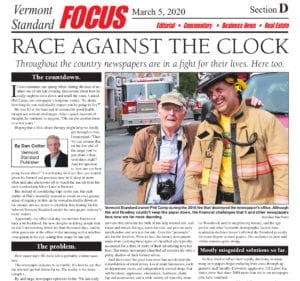
WOODSTOCK
- Barnard
- Bridgewater
- Hartland
- Killington
- Plymouth
- Pomfret
- Quechee
- Reading
- South Woodstock
- South Woodstock
- West Windsor
Please support the Vermont Standard Annual Appeal. Help now.



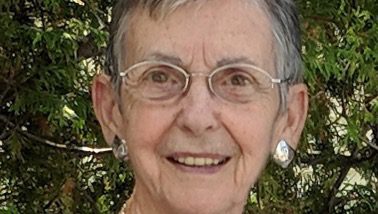
102-year-old Dorianne Guernsey is the last of the ‘grande dames’ of Woodstock
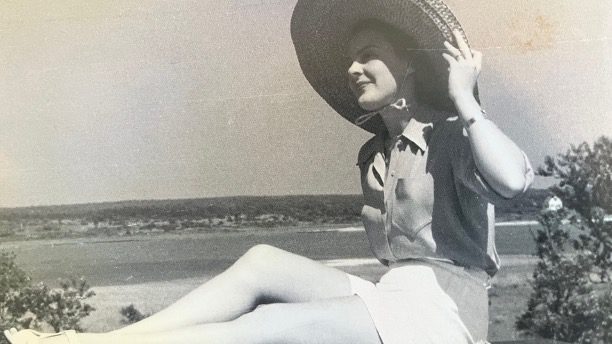

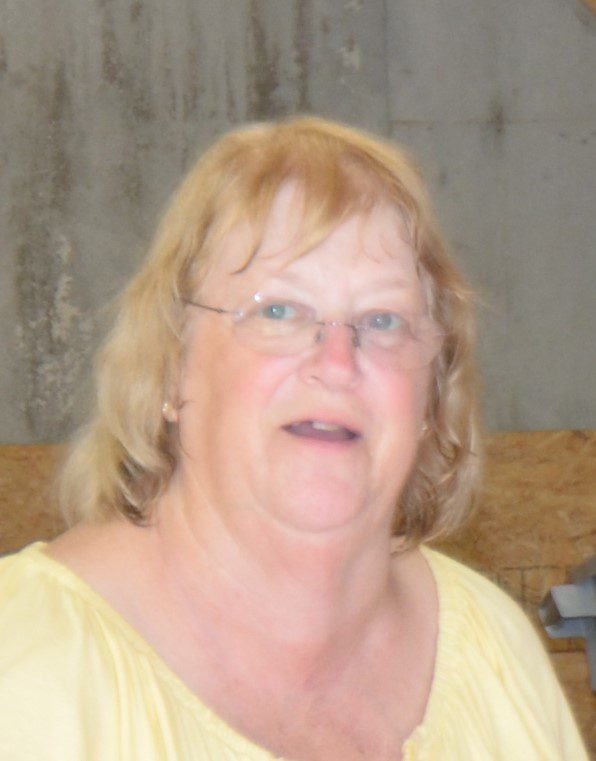
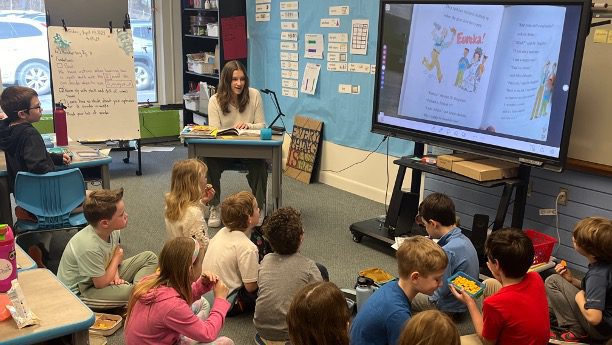
Recent Sports Scores
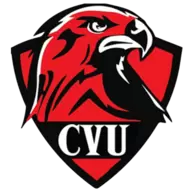

News
April 25
6:57 am
Mid Vermont Christian School asks to play, argues for injunction
Mid Vermont Christian School, which was expelled from the Vermont Principals’ Association because it refused to play in a girls basketball tournament game last year against a high school using a transgender player, asked the state group this week to reconsider allowing student participation.
The written request, which was made on Tuesday, comes in the wake of a hearing in U.S. District Court in Burlington about Mid Vermont Christian students being discriminated against by not being allowed to participate in many of the same activities as other students across the state.
Chief Federal Judge Geoffrey W. Crawford heard about 90 minutes of arguments. Mid Vermont Christian is seeking a preliminary injunction to allow their students to participate in extracurricular activities.
Meanwhile, lawyers representing the various defendants, including the VPA, the Vermont Agency of Education, and their leaders, asked the federal judge to dismiss the lawsuit filed in November by Mid Vermont and two sets of parents on behalf of their children.
Crawford took all the arguments and legal filings under advisement. He did not give any idea on how long it might take to issue a written decision on the complex issues.
Mid Vermont maintains it should not face additional penalties beyond a loss when taking a forfeit based on religious or free speech grounds.
During the arguments, Crawford said he understood the basic stances of each side about transgender students playing on athletic teams.
However, the judge did question why all students from the private school should also be banned from non-athletic extracurricular activities, like the state Spelling Bee, the Geo Bee, the Science and Math Fair, debate, and dozens of other activities where co-ed teams or individuals are allowed to participate.
It was during a series of exchanges by all the lawyers and with Crawford at the April 19 court hearing that the judge floated the idea that Mid Vermont Christian inquire at the VPA about permitting students to participate in co-ed activities and competitions while the lawsuit proceeds.
Attorney Steven Zakrzewski of Glastonbury, Conn. on behalf of the VPA, said Mid Vermont Christian had been told after the expulsion that it was free to re-apply. He said no application has been received as of last week.
The lawyers for Alliance Defending Freedom, who represent the private school and the two families filing the lawsuit, submitted a one-page letter on Tuesday seeking temporary participation.
For further details on this, please see our April 25 edition of the Vermont Standard.
April 25
6:56 am
Committee recommends postponing Town Hall project
After several months of deliberation, the latest group tasked with evaluating a proposed renovation of the Woodstock Town Hall appears to have agreed to recommend postponing any significant work to the historic building.
Last December, the Woodstock Selectboard formed the Town Hall Subcommittee to evaluate the necessity of renovating the Town Hall and determine the viability of relocating the town offices. While the committee was the third group tasked with evaluating the merits and necessary scope of a proposed renovation, it is the first “subcommittee,” as it includes members of the selectboard. It is also the first committee to explore relocation.
To better reflect this committee’s broader goals, Eric Duffy, Woodstock’s municipal manager, changed the subcommittee’s stated objective when it was formed from “recommend[ing] the best path forward for the town hall building” to “recommend[ing] the best path forward for the municipality” — underscoring that the best path for Woodstock may not align with the best decision for the building.
The subcommittee has just three members: Ray Bourgeois, the selectboard chair; Laura Powell, a member of the selectboard; and Duffy.
Last week, the Standard posed several questions to determine where the subcommittee’s work is at now and what its plans are for the future.
Q: What are the next steps for the Town Hall project?
Powell: The Working Group’s recommendation, supported by the rest of the Selectboard, is to postpone our work until after the board discusses our goals and priorities for the town in the next month. It seemed shortsighted to make a recommendation and undertake costs that may not be in line with those priorities. We have a lot of big projects this year, and we need to treat them according to their urgency and impact.
Bourgeois: It’s not like the town hall is falling down, and we need to find someplace to go. It’s functional. We’ll see in the future if we decide to look again at our options, but between the aqueduct, the wastewater treatment plant, and potentially another school vote, we just didn’t think it was the right time to spend money that we really don’t need to spend.
For the full Q&A interview, please see our April 25 edition of the Vermont Standard.
April 25
6:56 am
Comments in front of jury cost deputy sheriff his job
A Windsor County deputy sheriff has lost his job after he was accused of making improper comments in front of a jury considering a sexual assault case in Washington County.
Cpl. Mark Belisle is no longer a member of the department, Windsor County Sheriff Ryan Palmer told the Vermont Standard this week.
Palmer said he had studied the independent investigation into the comments Belisle reportedly made during a trial at the Vermont Superior Court in Barre in February. Palmer said he reviewed the findings with Belisle, who had been helping provide courthouse security at the trial.
Palmer said a decision was made to part ways.
Barre City Police Chief Brad Vail, a former deputy chief in Hartford, conducted the independent investigation at the request of Palmer.
Belisle, reached by phone on Tuesday, said he was considering his options, including asking the Windsor sheriff to reconsider his action.
Judge John Pacht said he directed the jury verdict be set aside and ordered a new criminal trial after learning about possible unsuitable remarks made in front of a jury by Belisle, a five-year veteran of the sheriff’s department.
For further details on this, please see our April 25 edition of the Vermont Standard.
April 25
6:55 am
Selectboard, Trustees deliberating short-term rental ordinance
Update: April 25 at 4:00 p.m.
Following the joint Selectboard and Village Trustees meeting on Wednesday, April 24, the boards were unable to come to a decision regarding the fees referenced in the proposed short-term rental ordinance. A third meeting has been scheduled for Tuesday, April 30 for further discussion and a possible vote.
Published April 25, 2024:
On Wednesday, April 17, the Woodstock Selectboard and Village Trustees held a joint meeting to discuss a proposed short-term rental (STR) ordinance.
If passed, the ordinance would standardize rules and fees across the Village and Town, cap STR operations to 5% of Woodstock’s housing stock, and remove operation limits so that permitted STR operators can rent as many times a year as they want.
The planning commission, which designed the changes, has recommended that the board put the ordinance into effect no later than July 1. To meet that deadline, the board needs to vote by May 1 due to the ordinances’ mandatory 60-day review period.
The boards began their discussion by establishing that all board members agreed an updated STR ordinance of some kind was necessary.
The new regulations would cap the number of STRs at 55 for owner-occupied units and 55 for non-owner-occupied units, which is roughly 5% of Woodstock’s housing stock. According to Laura Powell, a selectboard member and ex-officio member of the planning commission, the commission found that towns with STRs began to see significant decreases in long-term housing stock when STRs reached about 9%.
After significant discussion, the board members eventually reached a consensus that the proposed caps would work.
The boards then entered into a discussion about the proposed fees, which would be an annual charge of $750 plus $250 for each of the unit’s allowable occupants.
Several board members voiced concerns that fees were too high, while others noted that lowering the fees below the projected enforcement cost would be putting some of the burden of regulating STRs onto taxpayers.
Powell explained that the board could also investigate abating the fees of residents who fall under a certain income level.
The boards did not come to a final agreement about whether they wanted to investigate lowering the proposed fees, and they planned to reconvene on Wednesday, April 24.
For further details on this, please see our April 25 edition of the Vermont Standard.
April 25
4:49 am
The Standard’s "Do802" app goes live
Do802.com, a new service of the Vermont Standard, is now live. The free, web-based app features a comprehensive calendar of events and an up-to-the-minute feed of deals, discounts, and announcements posted by local businesses. Do802 was designed to help quickly connect people to everything the Upper Valley offers. From favorite restaurants, local festivals, and unique exhibitions, to last-minute discounts on specialties and handmade Vermont products, there’s so much in the Upper Valley to take advantage of. Do802 offers a simple way to quickly find what to do so that residents and visitors alike can spend less time looking for their next experience, and more time enjoying it.
It’s simple to use Do802. The first section is an easy-to-navigate, interactive listing of things to do for fun and fulfillment in the Upper Valley each day. The calendar on Do802 offers a great way to see what’s happening, from concerts to community events to club meetings. Rather than digging through different websites, feeds, or emails, Do802’s “What To Do” section offers a simple, fast, and comprehensive way to find the right experience every time.
The second part shows a rolling log of special offers and announcements posted by local businesses and organizations. It features last-minute offers (e.g., “Half off muffins for the next hour!” or “Early bird special on tickets today only.”). It also includes reminders and announcements (e.g., “In thirty minutes, the band will take the stage,” or “Free book signing in two hours.”). Do802 is a way for businesses, both treasured and new, to instantly communicate with residents and tourists alike, giving users a chance to benefit whenever a bakery bakes too much bread or a matinee show doesn’t quite sell out.
Do802 was designed by the Vermont Standard to help fund the journalism in its paper. The Standard, like all local newspapers around the country, needs additional revenue to help make up for the loss of traditional print advertising. Do802 is just one way the Standard will be deploying creative solutions to help keep its community coverage flowing.
Do802 is a progressive web app, which means it can behave both like a website and a mobile app. Users can go to the Do802 website on any phone, tablet, or computer. On a mobile device, they can also save Do802 to their home screen, so it is easily accessible and acts just like an app. To save Do802 to your home screen on iPhones, go to Do802.com and click the share button (a square with an arrow pointing up) at the bottom of the screen. Scroll down the list of actions before tapping on “Save to Homescreen.” On Android, the same thing can be done in the three-dot menu at the top of the screen.
Features
April 25
6:55 am
102-year-old Dorianne Guernsey is the last of the ‘grande dames’ of Woodstock
By Tom Ayres , Senior Staff Writer
Lifelong friends and acquaintances describe beloved Woodstock centenarian Dorianne Guernsey as adventuresome, inquisitive, and passionate about people, the arts, and culture.
Guernsey, who turned 102 last October, is the last of what her longtime friend and caregiver, Tina Miller, calls “the grande dames of Woodstock,” a quartet that included the late Polly Billings, Jane Curtis, and Ann Debevoise, each of whom has passed away in recent times. Guernsey survives her Upper Valley friends of nearly six decades.

Dorianne Carolyn Downe and Otis Guernsey Jr. were wed in the chapel of St. Bartholomew’s Episcopal Church in New York City on Dec. 11, 1943. Courtesy of Dorianne Guernsey
The story of Guernsey’s extraordinary life unfolds at the intersection of three quintessential and successful American families of the mid-20th Century — the Guernseys, Graffs, and Neffs. It’s also the story of nearly 60 years of connection with the arts, culture, and politics of Woodstock, Pomfret, and the surrounding communities for the engaging 102-year-old. When a visitor joined Guernsey for lunch at her Mountain Avenue home in Woodstock last Thursday, the pair pored over lovingly assembled scrapbooks and photo collections that document Guernsey’s extraordinary life, in addition to spotlighting the countless friends and admirers from the Woodstock area who’ve feted her at both her 90th birthday celebration in 2011 and a centenary gathering at the Lakota Club in October 2021. Subsequent conversations with decades-long friends and admirers of the engaging Guernsey further fleshed out her compelling biography.
Born to industrialist George Downe and his wife, Vera Strauss Downe in Bayonne, N.J., on October 15, 1921, Dorianne’s storied path took her to France between the World Wars, to London and Switzerland during her adolescent school years, and then back to the United States after World War II, where she met and married the distinguished journalist Otis Guernsey Jr., the chief theater and film critic of the long-ago citadel of New York City journalism, the Herald-Tribune. Otis also edited the celebrated “Best Plays” collection, annual tributes to the best new American plays, for nearly 40 years, and was the longtime head of the Drama Quarterly magazine.
When the Herald-Tribune ceased publication in the mid-1960s, Otis and Dorianne opted to uproot themselves from their spacious New York apartment and the abundant Manhattan cultural scene and relocate to a farmhouse in North Pomfret, where one of Otis’ Tribune colleagues, fellow arts and entertainment reporter and critic Bert McCord, had purchased a home in the late 1950s. The Guernseys soon persuaded another New York friend, Patricia “Patsy” Kassner Graff, to visit them in Vermont, setting up a sort of “blind date” between Patsy, who had tragically lost her husband at the young age of just 45, and eligible bachelor McCord. The pair hit it off famously and, within time, Patsy married McCord and moved to North Pomfret with her two sons, Wesley Jr., then 14, and Chris Graff, 12.
Dorianne’s lifelong bond with Patsy Graff McCord and another childhood friend, the late Eric Neff, goes back to those years between World Wars I and II in France when Guernsey’s father George Downe was a European representative for the American Radiator Company, Patsy’s dad Lacey Kassner was the head of distribution for Columbia Pictures in Europe, working closely with the likes of Charlie Chaplin, and Eric Neff’s father Lewis was a prominent banker and commodities broker. It was an exciting time for a trio of close friends — Dorianne, Patsy, and Eric — separated by only a few years in age and inseparable in youthful pursuits such as frolicking on the summertime beaches of Normandy and Saint-Jean-de-Luz or romping in Parc Monceau, near the Downe’s family’s apartment in Paris.
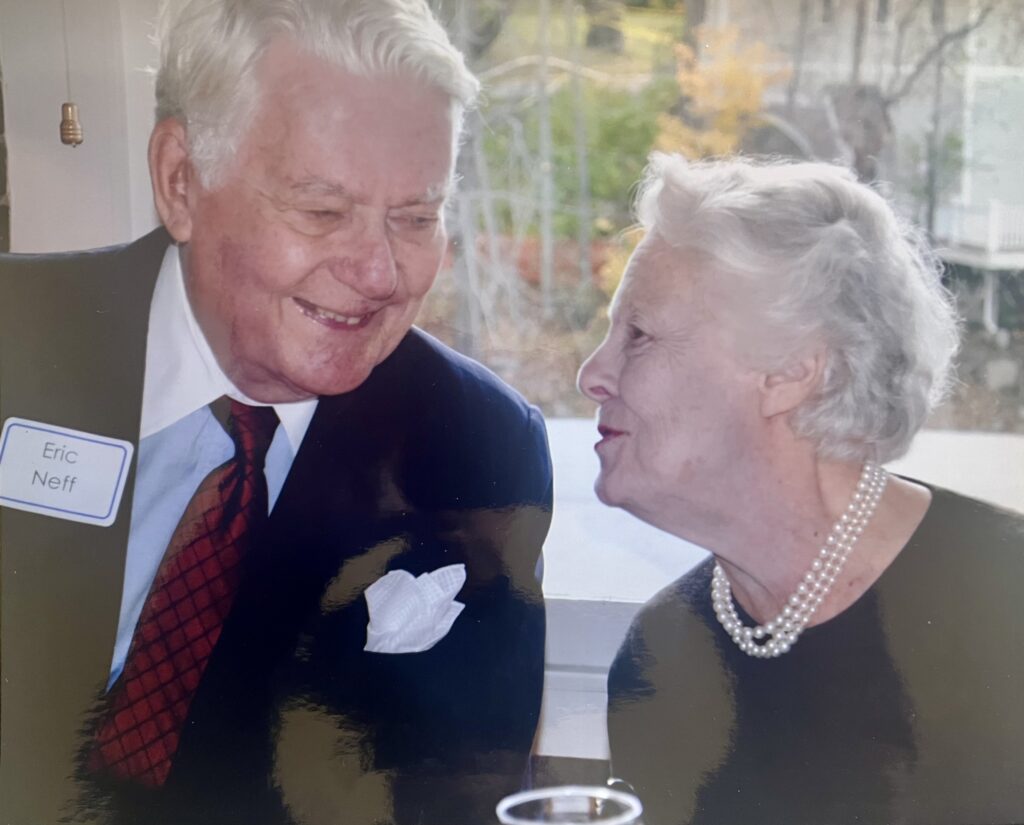
Lifelong friend, the late Eric Neff toasted his beloved childhood pal Dorianne Guernsey at a 90th birthday celebration at the Simon Pearce Restaurant in Quechee on Oct. 15, 2011. Courtesy of Dorianne Guernsey
It took the advance of World War II and the German occupation of France to separate the three friends, albeit only for the time being. The Neffs returned safely to their native New York before the war began in 1939. Dorianne’s and Patsy’s escape from the advancing Nazi forces was especially harrowing — part of the cement that bonded the two, plus Patsy’s younger sister Pammy, for a lifetime.
In the summer of 1940, Dorianne, her mother, and the Kassner’s mom Priscilla moved to Saint Jean-de-Luz and rented a big house. They stayed there for ten months, swimming in the ocean. Dorianne learned to drive there when she turned 17. With the Germans approaching Paris, 750 kilometers north of their beachside idyll, the Downes, Kassners, and several other friends and relatives opted to leave southern France. When it came time to leave, they learned that they could take only one suitcase and a limited amount of cash. Dorianne’s mother Vera and her Aunt Ethel piled into one car for the torturous escape trip into Spain, while neophyte driver Dorianne chauffeured her friends Patsy and Pammy, their mom Priscilla, and all the entourage’s worldly belongings in another vehicle. Dorianne recollected that she fretted throughout the trip, trying to avoid all the abandoned vehicles and people fleeing on foot along the road. She got in the last vehicle line out of France and crossed into Spain, where the Downes sold the car, boarded a train to Lisbon, and caught the famed S.S. Manhattan ocean liner to New York. The Kassners followed later, first to Los Angeles and then to New York.
The Neffs, back stateside for two years, stayed in touch with both the Downe and Kassner families — and subsequently the Guernseys as well. Eric Neff, like Patsy Kassner, remained a devoted, lifelong friend of Dorianne’s, visiting her frequently over nearly 70 years, wherever the Neff and Guernsey families’ travels led them. “We would see them whenever we were back here in the states,” 84-year-old Nancy Neff said in a phone call from her Burbank, Calif. home last Friday. “My husband was in the Foreign Service — the State Department, so we lived abroad. I met up with Dorianne for the first time when we were on leave and I was pregnant with Rebecca,” she added. “Over the years, we traveled a lot together — to Italy and Greece and, of course, France. I remember we celebrated my husband’s 80th birthday in Sicily.”
Rebecca Neff Short, who was born in 1972, also participated in the phone chat about Dorianne. “I was a little girl most of the time I was around Otis and Dorianne,” she offered. Short refers to the Guernseys as aunt and uncle, even though they are not blood relatives. “I always remember how much vitality Dorianne had,” Short said. “She was just a constant presence in my father’s mind. She visited us when we lived in Brussels. She’s my godmother, so we’ve always been in contact, ever since I was a little girl,” the 52-year-old added. “She’s just been this vibrant presence in my life for as long as I can remember.”
Dorianne Downe met Otis Guernsey Jr. through her Aunt Margot shortly after settling in New York. Soon they were seeing one another often, sharing evenings at such fashionable Manhattan hangouts as the famous Stork Club. Dorianne Carolyn Downe became Mrs. Otis L. Guernsey in the chapel of St. Bartholomew’s Episcopal Church on Park Avenue in New York City on December 11, 1943. Soon, Otis’ long tenure as the theater critic and entertainment editor for the Herald-Tribune began to blossom, while Dorianne worked as a publicist for Boeing and General Motors. The couple lived at 9 East 10th Street in Greenwich Village, where Dorianne frequently strolled through Washington Square Park with her poodle, Morgan, and miniature Schnauzer, Bingo.
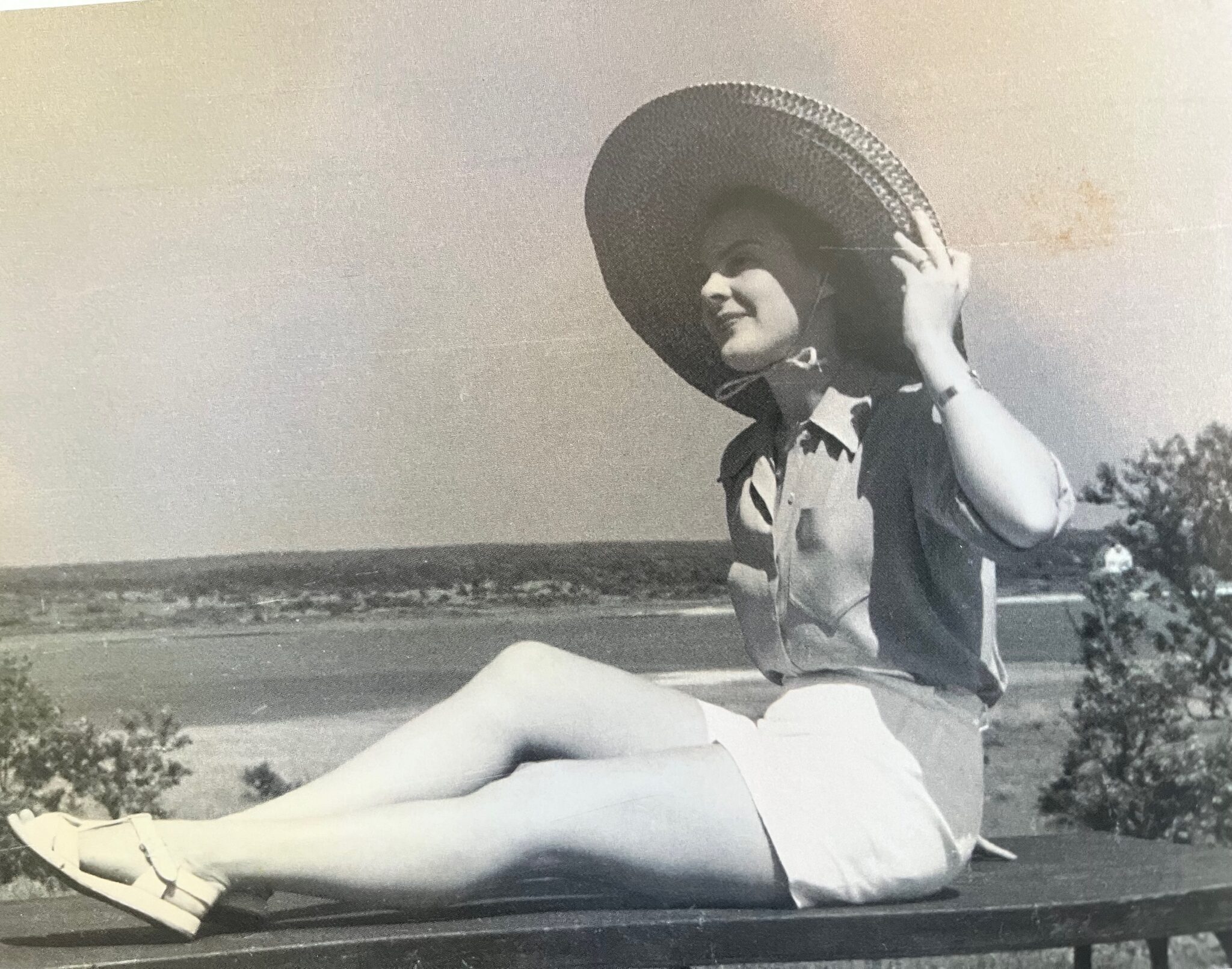 Dorianne Guernsey struck a classic, fashionable pose in this undated beachside photograph from Martha’s Vineyard in the late 1940s or early 1950s.
Dorianne Guernsey struck a classic, fashionable pose in this undated beachside photograph from Martha’s Vineyard in the late 1940s or early 1950s.
Courtesy of Dorianne Guernsey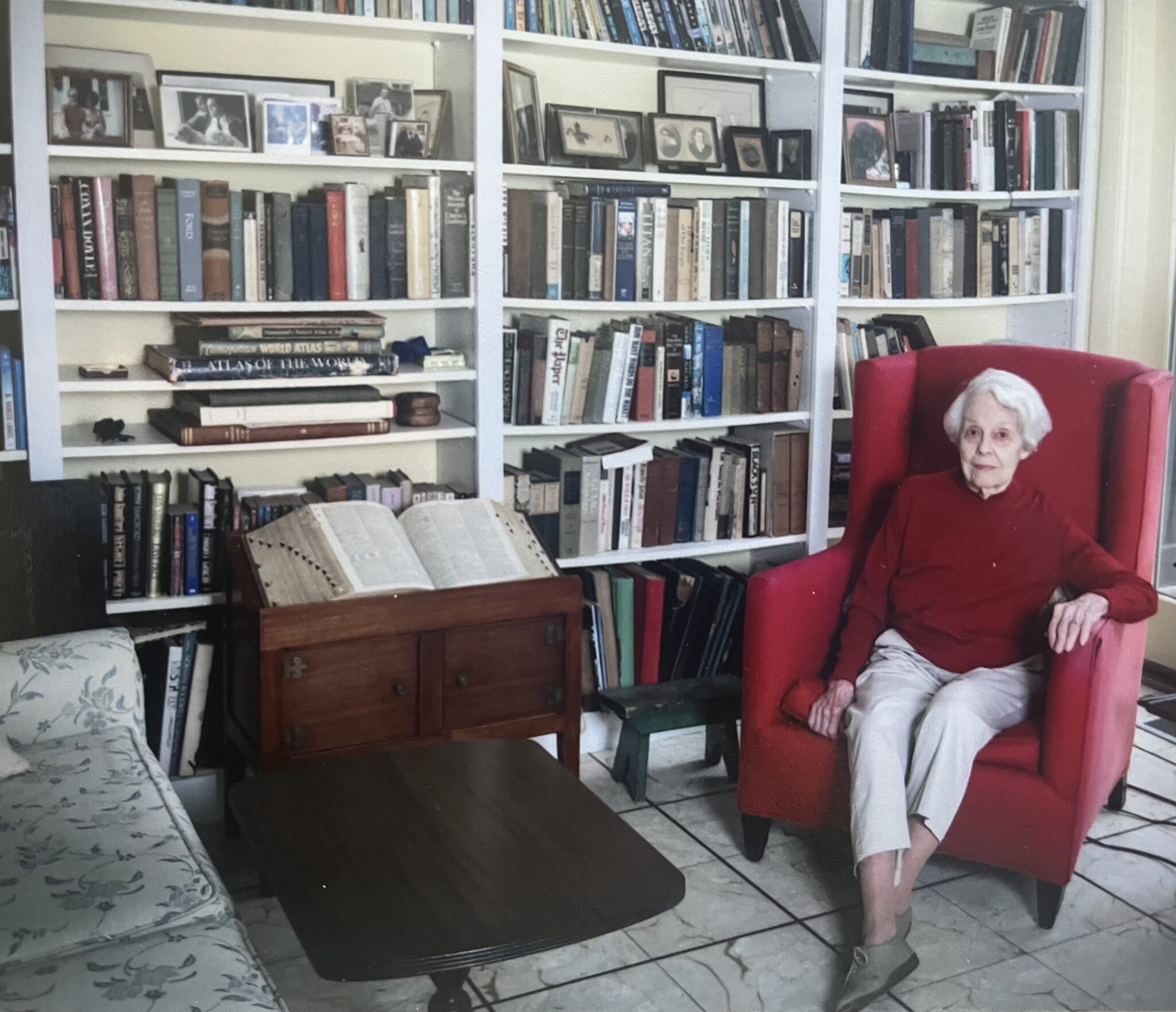 Dorianne at 101, relaxing at her home on Mountain Avenue in Woodstock in the fall of 2022.
Dorianne at 101, relaxing at her home on Mountain Avenue in Woodstock in the fall of 2022.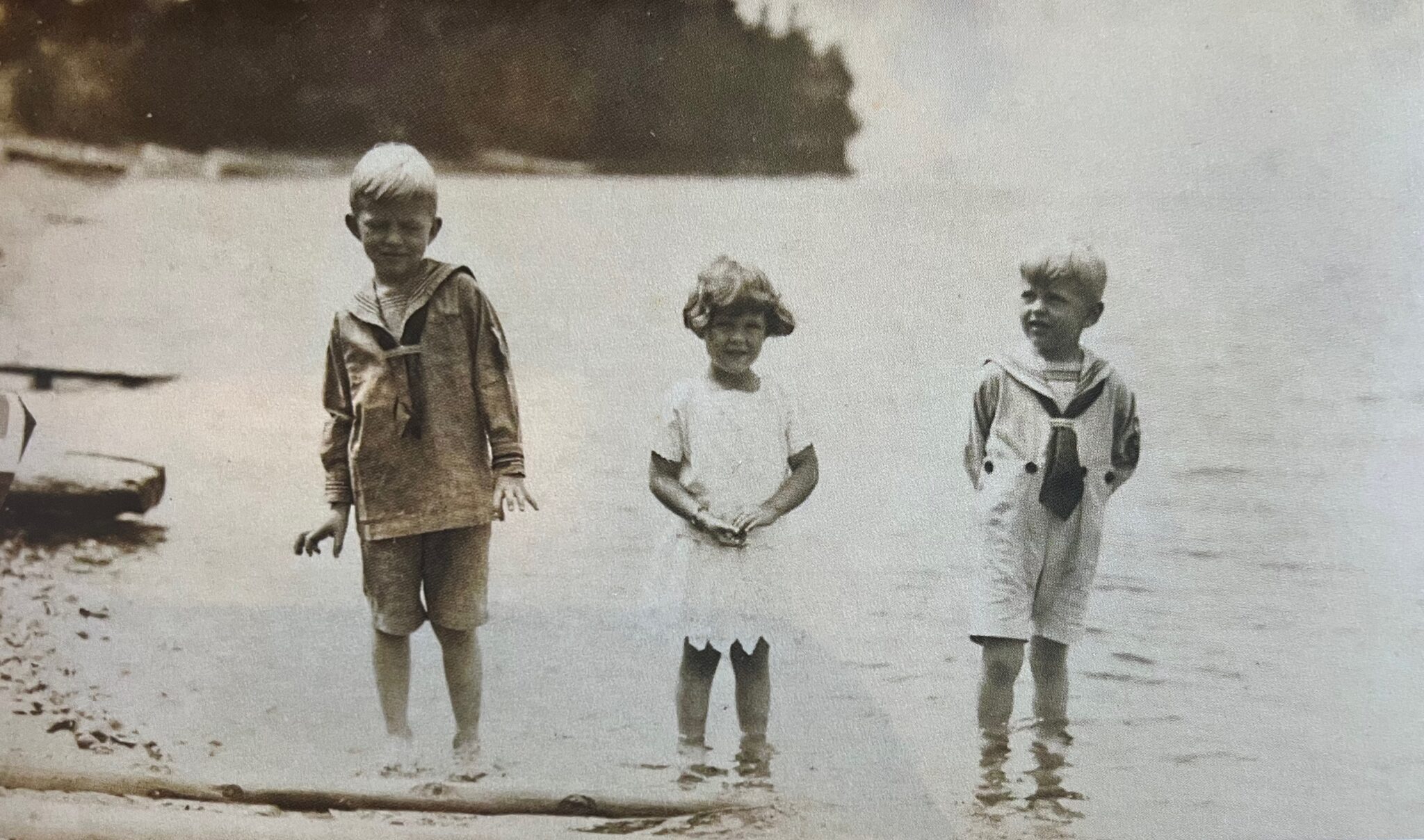 Dorianne Gournsey’s roots in Vermont go a long way back. One summer in the 1920s, the Downe family went to visit with George Downe’s mother, Dorianne’s grandmother, at her farm on the shores of Lake Champlain. There Dorianne met her American family and played in the lake with her cousins.
Dorianne Gournsey’s roots in Vermont go a long way back. One summer in the 1920s, the Downe family went to visit with George Downe’s mother, Dorianne’s grandmother, at her farm on the shores of Lake Champlain. There Dorianne met her American family and played in the lake with her cousins.
Courtesy of Dorianne Guernsey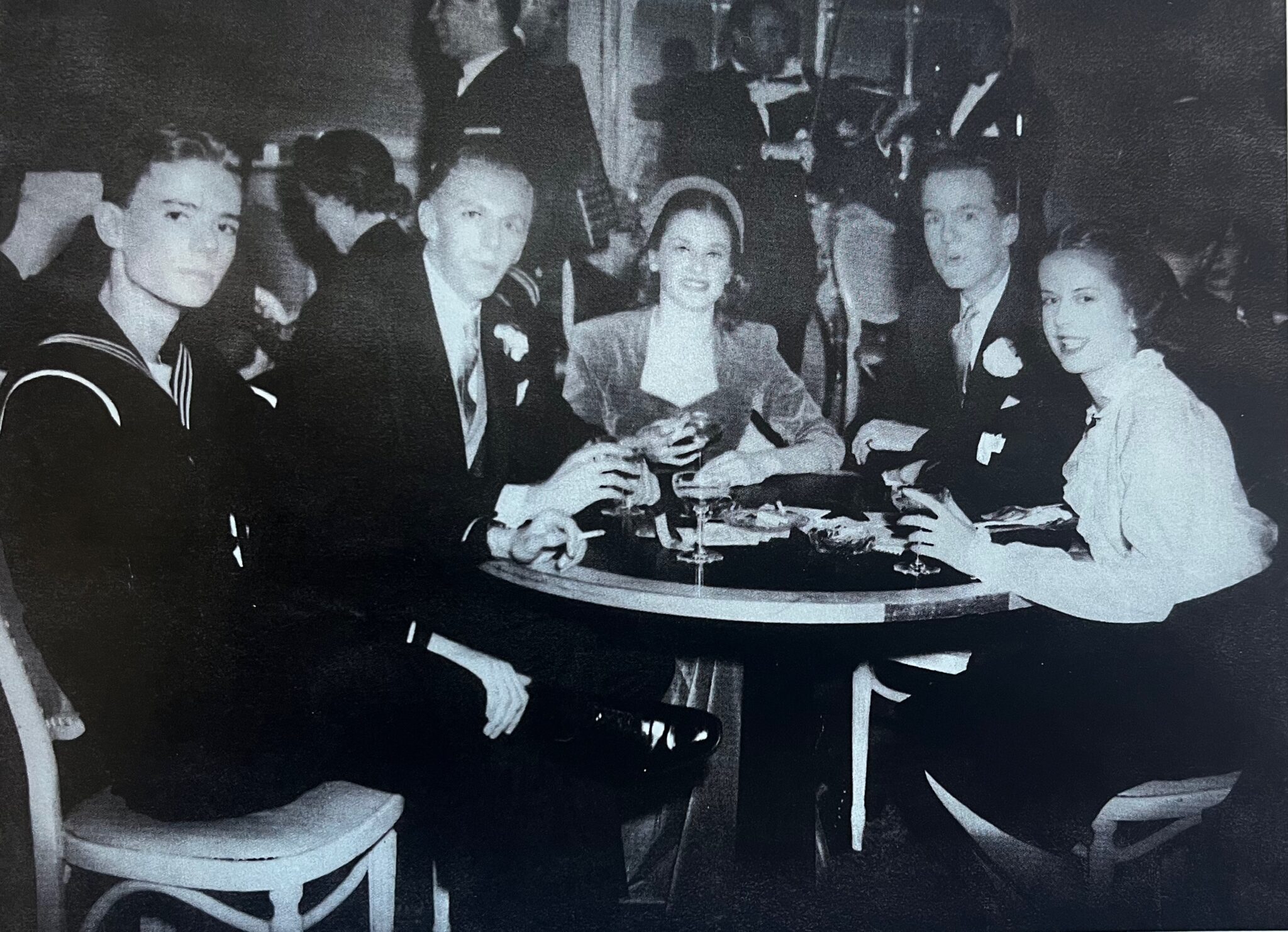 Dorianne Gournsey’s roots in Vermont go a long way back. One summer in the 1920s, the Downe family went to visit with George Downe’s mother, Dorianne’s grandmother, at her farm on the shores of Lake Champlain. Dorianne met her American family and played in the lake with her cousins. Courtesy of Dorianne Guernsey
Dorianne Gournsey’s roots in Vermont go a long way back. One summer in the 1920s, the Downe family went to visit with George Downe’s mother, Dorianne’s grandmother, at her farm on the shores of Lake Champlain. Dorianne met her American family and played in the lake with her cousins. Courtesy of Dorianne Guernsey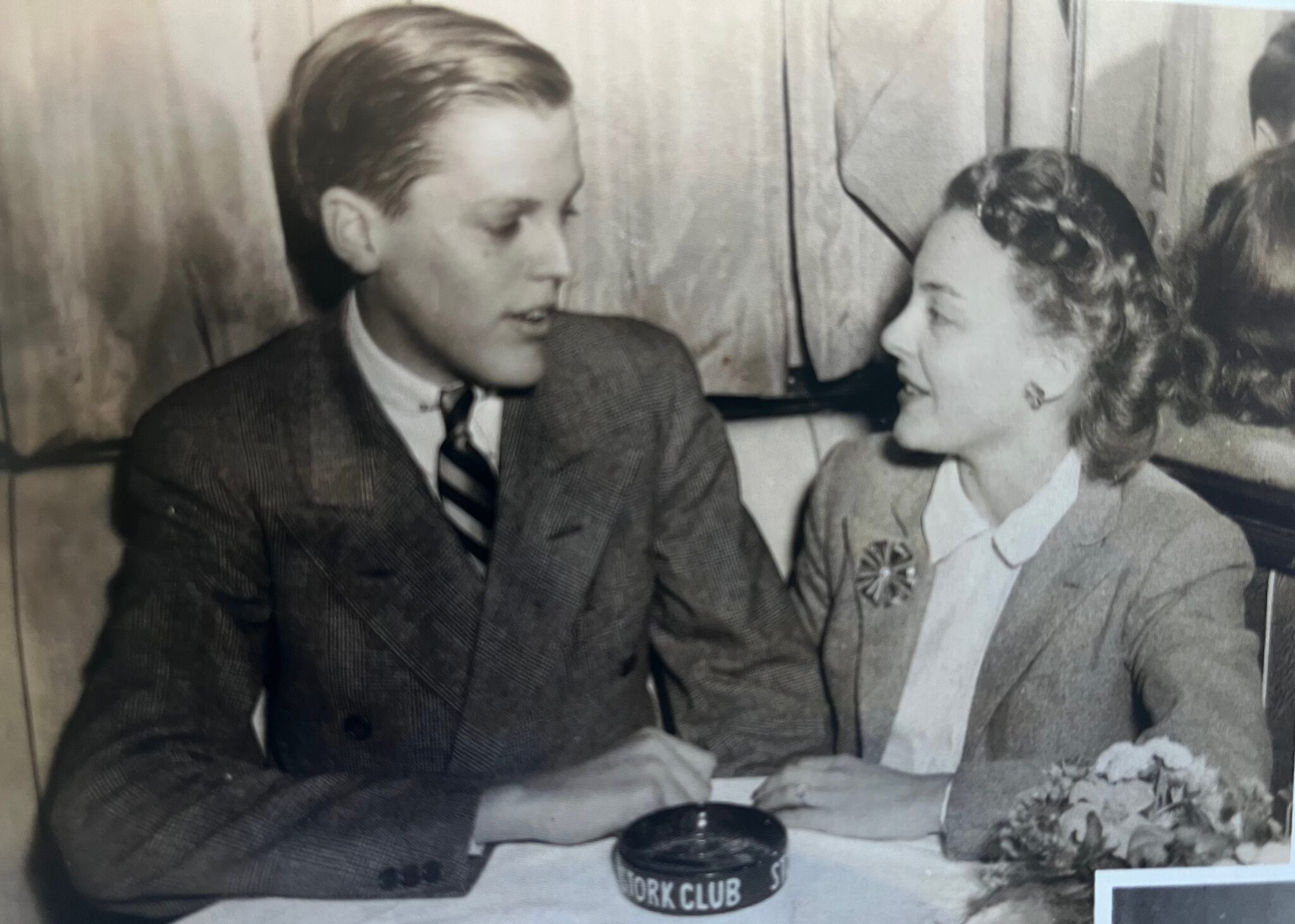 Otis Guernsey and Dorianne Downe began dating in the early 1940s, after being introduced to one another by Dorianne’s Aunt Margot. The couple, who married in December of 1943, are shown here at the legendary New York night spot, The Stork Club.
Otis Guernsey and Dorianne Downe began dating in the early 1940s, after being introduced to one another by Dorianne’s Aunt Margot. The couple, who married in December of 1943, are shown here at the legendary New York night spot, The Stork Club.
Courtesy of Dorianne Guernsey
For the next 15 years, it was a captivating, charming life, with Dorianne serving as an engaged, insightful adviser to Otis, counseling him on his work and play selections for the “Best Plays” series. The two were central figures in the exploding arts and culture scene of postwar Manhattan. Sailing also became a constant in Dorianne’s and Otis’ lives during this period, whether it was sailing from Bridgeport, Conn., along Martha’s Vineyard, or up and down the East Coast — even traveling to Australia to watch the New York Yacht Club try to recapture the America’s Cup.
Then, in the mid-1960s, as the Herald-Tribune fell into financial turmoil, the Guernseys turned their world upside down and left their year-round environs in hyperactive New York, joining their good friend Bert McCord in pastoral North Pomfret. Otis continued to edit the annual “Best Plays” series, which he compiled for 36 years from 1964 until 2000 and carried on at the helm of Drama Quarterly, the respected television, film, and drama publication. Regular business trips back to New York were standard fare for the theater critic, while Dorianne immersed herself in the Woodstock area social and cultural scenes. She joined with Polly Billings and other community leaders, including Gennie Carouso, Patsy Niles, and Bob Belisle in helping to found Pentangle Arts, and volunteered at several Woodstock area art galleries, most notably the late Ellison Lieberman’s Gallery 2 in the 1970s and ‘80s.
An inveterate reader, Dorianne long participated in a monthly book club with her cherished friends Curtis, Debevoise, and Billings. Wesley Graff Jr., who spent his teenage years in Pomfret with his mom, Patsy Kassner Graff McCord, and then went on to head the film department at UVM and be a celebrated documentary filmmaker, remembers two things in particular about the Woodstock area “grande dames” that were especially memorable from his youth.
“Dorianne, my mother, Ann Debevoise, and Jane Curtis would all get together for what they called their ‘Frunch’ Club, because they all spoke French. They’d get together for lunch somewhere once a week and speak to each other in French,” Graff said, chuckling. The 73-year-old filmmaker, who retired from UVM in 2011, also fondly remembers how Dorianne and her friend Billings advocated for him in his “long-haired hippie days” when he had a novel idea for a Christmastime pursuit along The Green in Woodstock Village. “I wanted to roast chestnuts and just give them away on the main street there in the Village. The selectboard said that sounded crazy and they wouldn’t let me do it. But Dorianne and Polly spoke to them and they changed their minds and said I could do it. I still remember having a great time, standing there with that hibachi,” Graff enthused. “Dorianne was always there for our family gatherings,” Graff, who now lives in Fairlee, added. “There’s so much history there. She was just so much fun — and she and Otis were always family. My wife and I still get down to Woodstock four or five times a year to visit Dorianne.”
Shortly before he passed away in 2001 at the age of 82, Otis Guernsey persuaded Dorianne to leave the North Pomfret farmstead and move into a smaller, more manageable home on Mountain Avenue in Woodstock Village. The centenarian lives there to this day, cared for in recent years by her friend Miller and visited regularly by a coterie of friends and neighbors who continue to hold her dear. Mountain Avenue neighbor Linda Smiddy first met Dorianne when she settled into her new abode across the street and they’ve been fast friends ever since.
“I often go and visit Dorianne and we sit there and go through those scrapbooks and she shares her memories,” Smiddy said last weekend. “She’s just incredible, with all those stories of growing up in France and all the ballets and theater she so thoroughly enjoyed in New York. She’s just so passionate about the arts. She’s had a very sophisticated life. I remember when she and I used to look out over Faulkner Park and talk about books. I’d be out in the yard and she’d be walking her dog and we would stay there for ages, just talking about various forms of literature.”
April 25
6:55 am
WUHS internship program jumpstarts student careers
By Tom Ayres , Senior Staff Writer
The internship program at the Woodstock Union High School Center of Community Connections (C3) has been in place since 2018. It enables select juniors and seniors at the high school to explore a diverse range of career opportunities in the region.
“When we started the C3 program, we knew we wanted to serve a wide variety of students,” explained WUHS teacher Beth Hayslett, the C3 program co-director, on Monday afternoon. “The idea behind the internship program is to give students with the maturity and the preparation the opportunity to be outside of the school building for a good part of their day taking part in an in-depth, career exploration opportunity. It’s about giving them the chance to really dive into a career that they’re interested in.”
Luis Bango coteaches and manages the C3 programs with Hayslett. He also weighed in on Monday regarding the impact of internship experiences on students. “I think it’s a culture. We’re trying to shift the culture around to this idea of career exploration, career readiness, and career-connected learning,” Bango offered. “Sure, there were some setbacks due to the pandemic, but we’re steadily growing the program back. We’re creating a culture that really facilitates students getting out of the building and into career-type experiences.”
The Standard visited last week with three WUHS students who are taking part in diverse educational internships during this current spring term. Here are their stories, together with comments from the mentors in each of their work settings.
Sage Campisi — Kedron Valley Veterinary Clinic, Woodstock
Sage Campisi has loved animals since she was a toddler. A Stockbridge native, she grew up raising dogs, cats, rabbits, sheep, and pigs on her family’s homestead. She’s been active in the Future Farmers of America (FFA) chapter at WUHS. It’s no wonder, then, that she told WUHS C3 coordinators Hayslett and Bango last year that she wanted to pursue an internship with a veterinary clinic during her senior year.
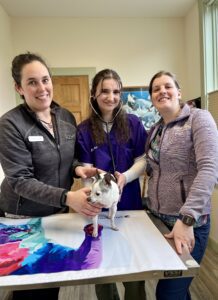
WUHS intern Sage Campisi, center, listens to the heart of furry friend Rosie, a rescue pup from Puerto Rico, as Kedron Valley veterinary technicians and internship mentors Hannah Curtin, left, and Taylor Armbruster look on. Tom Ayres Photo
Campisi has been interning at the Kedron Valley Veterinary Clinic in West Woodstock since last fall. The experience follows on the heels of a service-learning project at the Lucy MacKenzie Humane Society in West Windsor that Sage completed during her junior year.
“I find animal anatomy more interesting than human anatomy,” Campisi said during a phone interview last Friday. “I like the idea of helping a lot of animals, especially animals that don’t often get the help they need. I’d like to work with as many animals as possible.” Sage has been mentored at Kedron Valley by veterinarian Dr. Blakely Murrell-Liland and by a skilled team of veterinary technicians who’ve taken the quiet, reserved young woman under their collective wings. The experience has paid off handsomely for Campisi: since the internship got underway, she’s applied to the well-regarded veterinary technician program at Vermont State University (formerly Vermont Tech) in Randolph and has been accepted. She’ll begin her studies toward a two-year A.A.S. degree at the school in August.
Observing Murrell-Liland and working with the Kedron Valley tech staff for eight to twelve hours a week, Campisi has begun gaining a wealth of skills. “I’ve learned how to interact with clients,” the oft-shy WUHS senior offered. “I’ve learned how to run some simple tests, blood tests, things like that. I’ve been able to pull up some vaccines using syringes. It’s given me a lot of confidence and it will definitively help me when I start school this fall.”
Campisi could not have asked for a better mentor as she explores a career helping animals than Hannah Corbin, a graduate of the former Vermont Tech program who has worked as a certified veterinary technician for the past 12 years. Now a tech at Kedron Valley, Corbin serves on the advisory committee for the Vermont State University A.A.S. program and is also the current president of the Vermont Veterinary Technician Association. As such, she is heavily engaged in career development activities throughout Vermont.
“When Sage reached out to us, we met with her to see if she’d fit here because we really don’t have extra time for people who aren’t very interested,” Corbin said during a customer service counter interview at the West Woodstock clinic last week. “She started out pretty quiet, but she has definitely gotten her sea legs,” Corbin continued. “She watches everything we do and she goes to a lot of exams with the doctor — wellness exams, checking for illness, all of that. She assists with vaccines — she doesn’t give them, but we’ve taught her some basic restraints during exams, so she knows her way around those pretty well. We’ve taught her how to move through our in-house laboratory and do specimen prep. She seems so legitimately interested in the field, which is so cool to have someone so engaged.
“She has another part of her co-op work at school where she does pinstriping and car detailing at Collision Works in White River Junction. She’s just such a multifaceted kid and she’s a real smart cookie. I’m sure she’s going to be really successful in the vet tech program,” Corbin concluded.
Brooke Hecker — Woodstock Elementary School
WUHS senior Brooke Hecker, who is interning in Betsy Frates’ second-grade class at Woodstock Elementary School (WES), has known she wanted to be a teacher since she herself was in the second grade.
“Since second grade, I’ve always said that I wanted to be a teacher when I grow up,” Hecker stated in an interview last Thursday evening, shortly after arriving home from tennis practice with her high school teammates. “But up until now, I’ve never really been able to be in front of a classroom. I’m a camp counselor at my hometown Killington day camp in the summer and I’m a babysitter all year-round, but this is different. I’m now fully committed to attending Providence College in the fall for elementary and special education. I am super excited to be a teacher in the future.”
Hecker connected with WES for her internship through several avenues: her mother, Tiffany, works in the administrative office at the school and she’s gotten to know Frates through that connection. She’s also babysat after school for WES Principal Maggie Mills’ two young children. She knew from the start of the internship application process that she wanted to work with Frates. And Frates said Monday evening that the feeling was mutual: “I tutor in the afternoon and Brooke was often there watching Maggie’s kids,” Frates said of the last WES school year. “She’d be in the library reading to them or playing games, and so I saw her capabilities and was absolutely thrilled to have her intern with me.
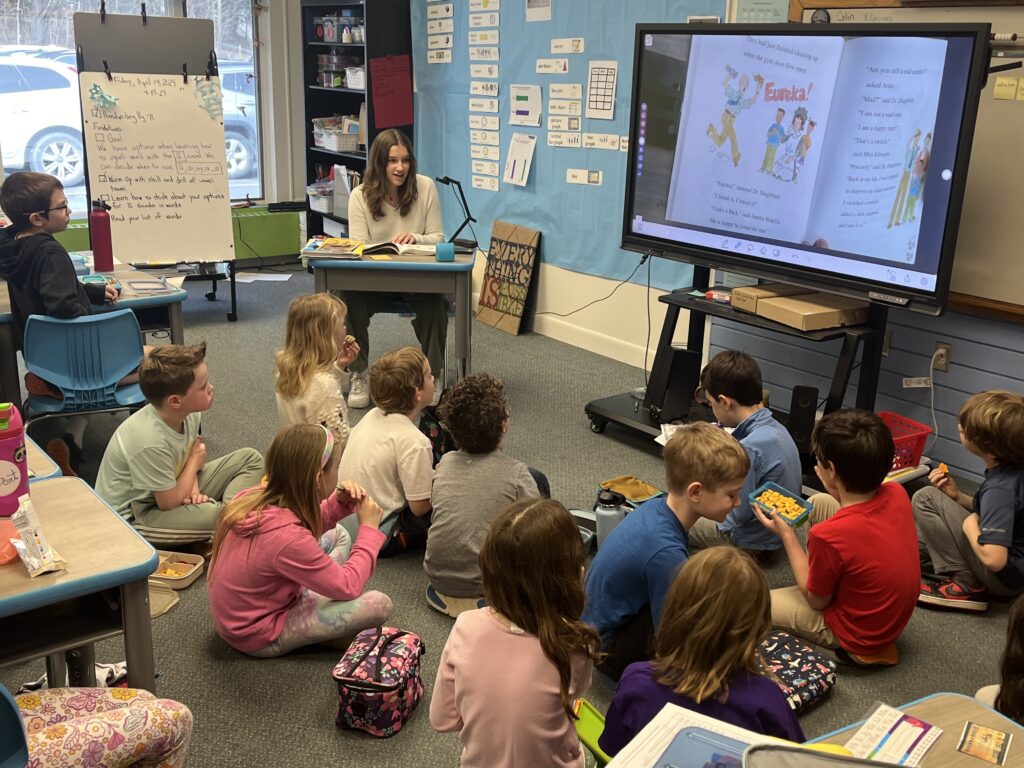
Brooke Hecker, a WUHS senior, reads the beloved children’s book “Amelia Bedelia” to teacher Betsy Frates’ Woodstock Elementary School second—grade class. Hecker spends several mornings a week in the second—grade classroom as part of an internship that will bolster her as she seeks a career in elementary education.
Tom Ayres Photo
When a visitor stopped by Frates’ second-grade classroom last Friday, Hecker was seated at the head desk, reading the children’s classic “Amelia Bedelia” to her charges while they had their mid-morning snack break. It’s a task she performs several times a week when she visits WES for three-hour internship stints. Each week, Hecker also assists Frates and her second graders with Spanish classes, hands-on creative projects, and reading lessons, to name but a few of the educational endeavors the WUHS senior has engaged in.
“I’ve always been someone who wanted to learn more and more,” Hecker commented last week. “I’m always pushing myself to take the hardest classes and just absorb all the information I can. When it comes to translating that into a career, I just want to be able to light that spark in other people, whether it’s through being a babysitter, camp counselor or eventually a teacher. I’ve seen the ways in which kids learn and absorb new information so much faster than I can even comprehend. It’s just so cool watching them learn and grow, knowing how much I love learning and growing.” The high school senior said she acts out of that same passion as a tennis player on the WUHS varsity squad and as a member of the WUHS Social Action Club, Spanish Club, and National Honor Society.
For her part, Frates has no doubt that Hecker will make a great teacher. “The kids are always asking where she is and when she is coming in,” the veteran second-grade teacher offered. “When she comes through the door, the kids run up and give her hugs and they do it again when she leaves. If the opportunity comes up for me to host an intern again, I’ll gladly do it — it’s a great opportunity and I love it. We need teachers and we need for kids to find out that teaching is something they are interested in. I think it’s a great idea to let them spend more time in a school,” Frates concluded.
Lilly Macri — Elevation Clothing, Woodstock
You won’t find a more enthusiastic and bonded pairing of mentor and intern than Kimbel Biele, the proprietor of the Elevation Clothing store in Woodstock Village, and WUHS junior Lilly Macri.
Macri, a lifelong Reading resident, hopes to major in business in college. Now 17, she’s been working part-time at Elevation since she was 15 when she walked into the action-oriented clothing store seeking a job to help her start saving money for college.
“Lilly came in and our store was absolutely crazy that day,” Biele said when a visitor dropped by the Village clothing emporium to meet with her and Macri last week. “I asked her, ‘How do you feel about stress? And she’s like, ‘I like stress. And I said, ‘Good. Can you start right now?’ When it comes to the internship, I’m the one who is winning here,” Biele enthused.

Kimbel Biele, left, the proprietor/manager of Elevation Clothing in Woodstock Village, poses with WUHS junior Lilly Macri. Macri, who has worked at the store for some time, plant to major in business. Tom Ayres Photo
“When I started working there, it was kind of a job to fill my time when I wasn’t in a sport,” Macri, a WUHS soccer team member, said in a phone interview last Thursday. “But Kimbel has shown me the ins and outs of what it’s like to be in retail and what it’s like to be a businesswoman. I’ve gotten the inside scoop of what she does in the store to make it a better place for the workers and for the customers. I’ve also been able to go with her on buying trips to see different brands and to trade shows, too. And I get to see all sides of what goes on, even when Kimbel is not in the store: how she makes it a better place. So I’m really interested in pursuing this small business aspect of a career. It’s what I’m looking to major in when I go to college.”
Biele said Friday that Macri will soon be joining her on a spring buying trip to meet with a representative of Patagonia, one of Elevation Clothing’s leading lines of action wear. “She’s mainly done the rollout of the fall line for Patagonia, so it will be fun and instructive for her to see another season of the same line,” Biele said of Macri’s burgeoning level of experience in running a retail clothing store. “I’ll be able to open up the new inventory, go through the whole backroom process, and then actually put it out on the floor,” Macri noted.
The nuts and bolts aspects of running a retail business are central to what Biele is conveying to Macri throughout the WUHS junior’s employment and internship. “She comes with me on the buying trips and to shows such as the one we went to in Manchester, N.H., recently — and she gives me her point of view,” Biele offered. “We talk about why I picked what items and what sizes, with one going from extra-small through medium and another one going from medium through extra-large. And she helps me in the back room — when things come in and I’m away for a long time, I’ve put her in charge of the back room. That’s a big step in her learning curve.”
Macri’s become quite conversant about Elevation’s diverse product lines — and she’s grown increasingly confident in advising customers and steering them toward the clothing that’s just right for them, no matter their age or body type. “It says on our sign that Elevation has the styles for your active life,” Macri averred. “I think that’s the best way to describe it. You walk into our store and we have everything for your active life, whether that may be skiing, biking, or running. But we also have just fashion, more specifically. We have Toad & Company sustainable clothing, which is based in California – a very fashionable brand. We have a new denim line that has just hit the store.”
Biele particularly touts Macri for her skills and insight in interacting with customers — something that the clothing retailer considers “remarkable and unusual” for a young woman of Macri’s age. “She’s so good at working with customers,” Biele offered. “She’s really learned that she can make a difference and that she can make somebody feel better about themselves or even just their day. I think it’s important for teenagers to know that eye contact really makes a huge difference in somebody’s life — genuinely caring where they’re visiting from. We talk about that a lot, and I think she’s really seen the difference.”
While amid her junior year and the Elevation internship, Macri is also engaged in a ritual for college-bound, third-year high school students: checking out college campuses and academic offerings. “I’m really looking in the Northeast right now,” Macri explained. “Boston University is my top school — I love the business program there. But there are so many other opportunities, too. I’m looking at other schools in Massachusetts, Rhode Island, and Vermont.”
Contacted Monday, Hayslett said she’s convinced that Macri’s internship is setting her up for success at whatever school she chooses to attend. “Lilly has had some opportunities that typically don’t come the way of a high school junior. That really sets her up well for those college applications and beyond,” Hayslett concluded.
April 25
6:46 am
Simon & Schuster editor Priscilla Painton will speak at library gala
Books: A refuge and a revelation
By Tess Hunter, Managing Editor
Woodstock resident Priscilla Painton describes her beginnings as a small-town journalist, who would eventually rise to editor-in-chief of book publisher Simon & Schuster (S&S), as something of a “Greek tragedy.” Her work as both a journalist and a book editor has spanned the gamut of the political spectrum, with biographies on everyone from Hillary Clinton to Mike Pence, Kamala Harris to Elon Musk. She and her authors have tackled such topics as Wall Street and Russian intrigue in “Red Notice” by Ben Browder, brain health in “Keep Sharp” by Sanjay Gupta, and science and philosophy in “Why Buddhism is True” by Robert Wright.
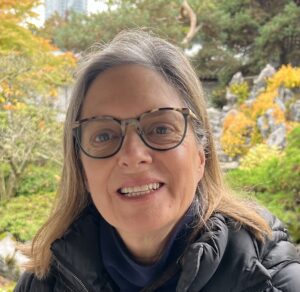
Priscilla Painton, editor-in-chief at book publisher Simon & Schuster, moved to Woodstock as a self-described “climate refugee.” She will speak about the resilience of the written word at a NWPL event at the Woodstock Inn on April 28. Photo Provided
On April 28, Painton will appear at the Norman Williams Public Library “Ex Libris Gala” to speak on “The Book: A story of resilience.” Ironically, Painton says she and her husband came to Woodstock out of their own desire for resilience. When asked why she moved to Woodstock, Painton told the Standard, “I think I’m going to blame books. I published about two or three global warming books. And I became convinced that it was important to find a place that was more climate resilient than New York or Massachusetts.” A self-described “climate refugee,” Painton says she continues to tackle her job as S&S editor-in-chief through a combination of remote work, productive train rides, and a retired husband who doesn’t mind long drives.
But no matter where she’s located, or what job she’s in, Painton says her focus remains singular: she’s in it for the story.
“It’s a Greek tragedy in the sense that my parents were both journalists and their fathers on both sides were very prominent journalists. And so by the time I came along, there was all this… I don’t know, probably DNA pressure coursing through my veins,” Painton said in a Zoom interview last week. “My father and mother were foreign correspondents. So they moved to Europe in the mid-50s, not too long after World War II, and then they stayed and covered Europe for the next 40 years. They were based in Paris, and I think it would have been really hard for any child of parents like that to not be attracted to the excitement of a life where everybody you meet is interesting and has a story to tell. And a lot of them would come and spend time around our dinner table. I think that was contagious, as well as probably being an inevitability.”
Painton also describes herself as a bit of an outsider — no more so than when she first came to live in the United States as a college freshman. “My mother basically said that the French school system was terrific for the first 18 years of your life, but unless you were going to go into the French government, the higher education system wasn’t as good as what you could find in America. So I was not given a choice. I was packed off to America to college. It was a big shock, frankly,” she says. “English wasn’t even my first language. I spoke with an accent. I had read a whole different collection of books. I was very interested in politics and world affairs. And that’s not who you necessarily meet freshman year in college.”
Painton took a year off from college and secured a position as an intern at the Los Angeles Times. “I worked as a copygirl at night, but as an intern during the day. And even though there were some pretty hairy moments that summer, I realized that I was really completely addicted to journalism.”
That addiction followed Painton all the way to the Berkshire Eagle, a daily newspaper in Pittsford, Mass. “When I graduated, it was into the Reagan recession of 1980 and there were no jobs in journalism,” said Painton. “But there was one job at the Berkshire Eagle, covering the town of Lenox, Mass. I got the job because, the editor told me later, ‘I’ve never seen anybody so hungry in my life.’”
From the Berkshire Eagle, Painton rose to the Washington Post, then the Atlanta Constitution, and finally spent 19 years at Time Magazine. Painton says it was circumstance that forced her out of journalism and onto a new path.
“A lot of journalists have had to leave the industry they love,” she explained. “It was being squeezed. I really needed to find a way of staying employed deep into my 60s, and there was no guarantee that I could do it as a journalist. And as you’ve seen, the industry has, in fact, been decimated in the last 16 years.” She said that when the opportunity came to work as non-fiction editor at S&S — one of the “Big Five” publishing houses in the U.S., she thought, “‘Okay, well, the book industry still makes money, let me try that.’”
Painton says her work at S&S continues to be influenced by her experience as a journalist, as well as her drive to cover all sides of a story. “I’m a big believer that if you want to engage on big ideas and big moments, you have to do it across the whole spectrum of readers,” she said. “There’s been a lot of division in the country. But I think our responsibility is to continue to assume there’s going to be curiosity and interest by the reader in all kinds of stories from all kinds of points of view. And that does come from my years of being a reporter.”
She added, “I think it’s more urgent now to show that the industry publishes books on both sides of the aisle than it ever was. If only to try to bridge these divisions, and to show that you have faith in the readers. That they can decide on their own who they believe and what cause they find persuasive.”
Painton says her imprint is particularly known for “crash books.” “That’s when we acquire and literally put out [a book] as fast as the printing press will allow us. I have five of those coming this year. And the reason for that is because people want to read books about subjects when those subjects seem urgent and pertinent to them. So we try to meet that need with this ability to go fast on certain topics and with certain kinds of writers. In that sense, nothing’s changed from meeting the kinds of [journalistic] deadlines [to] the deadlines of crash books,” she explains. “We just announced, we’re publishing a book by Gretchen Whitmer, who’s the star governor of Michigan, and a presidential prospect. That’s one of the crashes we are putting out there. Because we think there’s tremendous curiosity about the next generation of Democrats going into this political season.”
Painton says it’s a careful balance between finding relevant “crash books” and those of more enduring quality. “There are certain books that we feel, in terms of their political urgency, need to come out fast. But then there are books that need to have enduring power. So we have two tracks. And some of the books that we do on a crash basis keep their enduring power. We did a very quick biography of Kamala Harris when she joined the ticket. If you read that, it’s still one of the best biographies of our vice president that is out there.”
On the enduring side of the spectrum, Painton is particularly excited about an upcoming re-release, “The Wolves of K-Street.” “[It’s] is a 50-year history of how big money took over big government in Washington by two reporters who spent a good eight years or more of their lives reconstructing that history. That’s the book I have to confess I’m most excited about because I really want people to understand how Washington works,” said Painton. “The story starts with a dead body and ends with a dead body, so it’s also a pretty exciting read. But it’s a revelation. And that’s what keeps me going.”
Last fall, private equity firm KKR purchased S&S. Painton says that, in S&S’s case, the purchase has been for the good. “KKR took over and decided that we had been under-invested as a sort of small part of the big Paramount empire,” Painton explained. “And so the first thing they did was essentially say, ‘Hire more editors, acquire more books. Expand your audio divisions, expand the kind of imprints that are possible now in the 21st century.’ Including [adding] one focused on Spanish-language readers. So that’s one way it’s affected us. We are being invested in.” In her speech at NWPL, Painton says she will attempt to explain this seeming infallibility of books — how, despite technological upheavals and a constantly changing media landscape, literature has endured. “It’s all the ways in which the predictions that have existed for a hundred years that books would diminish as a part of American lives has never come true. In fact, it keeps being contradicted by history. Just in my 16 years there, not only have e-books come along, but then audiobooks came along,” said Painton. “There are certain kinds of books that have bigger audio audiences. And many of those people buying the audio would never have picked up a book in the first place.
In her speech at NWPL, Painton says she will attempt to explain this seeming infallibility of books — how, despite technological upheavals and a constantly changing media landscape, literature has endured. “It’s all the ways in which the predictions that have existed for a hundred years that books would diminish as a part of American lives has never come true. In fact, it keeps being contradicted by history. Just in my 16 years there, not only have e-books come along, but then audiobooks came along,” said Painton. “There are certain kinds of books that have bigger audio audiences. And many of those people buying the audio would never have picked up a book in the first place.
“The world of readers, whether they consume the story through their ears, or on the page, has grown hugely just in my time there. And the avenues in which you can discover books have grown,” Painton continued. “It used to be, you went to your local paper, and you read the review, or you went to your national paper and read the review. Those channels have, in some cases, diminished. There are fewer newspapers with book reviews, but my kids learn about books on [TikTok or] Reddit, and occasionally Instagram. And what that means is that it has expanded the world of readers across generations, across races, and just as importantly, across classes.”
So what is the biggest threat to publishing today? “We won’t really know how AI is going to shake out. I don’t know that it’s a threat yet,” says Painton. “In some ways, I think it’s going to be an extremely handy tool in our business for cutting back on the drudgery and giving us more time to do what we’re really supposed to do, which is think of great book ideas and find authors to write those books. But there’s also a risk that people’s work will be imitated, and certainly stolen and repurposed in ways that don’t protect that voice in the first place. So I think until we know more, we should look at that with a certain amount of vigilance.”
Painton says that COVID, more than any other industry upheaval, reminded us of the power of good stories. “When COVID hit, our book-buying went off the charts.There was a tremendous amount of consumption for books for children. Because hey, you’re stuck at home and they need both books that will teach him about the world, but also keep them entertained. There was a lot of cookbook buying, because people are rediscovering their kitchen three times a day. But there were also a lot of people who decided to use that time to find comfort, joy, and enduring wisdom at a time when the world seemed upside down. And that’s why I think books endure,” Painton concluded. “At a time when the world seems stormy and chaotic, it’s a safe place. It’s a place where you’re living with characters and you get to choose those characters. You get to imagine and think about things that you might normally not give yourself that permission to in your public life. So it’s a combination of a refuge and an opportunity for trying out new ideas and having revelations.”
April 25
6:45 am
Woodstock chef Emery Gray named executive pastry chef at Trapp Family Lodge
By Lauren Dorsey, Staff Writer
After five years as a pastry chef at the Woodstock Inn and three as the Farm to Table manager at Billings Farm, Emery Gray will be returning to the Vermont culinary scene beginning Saturday as the new executive pastry chef at the Trapp Family Lodge in Stowe. Gray, who has been working in Boston for the past year, will be stepping into her new role just two days before the April 8 eclipse is predicted to bring swarms of travelers to the area. “What a way to start. It’s going to be incredible,” Gray told the Standard. “I’m ready to jump in with both feet. It’ll be just like the thick of foliage season.”
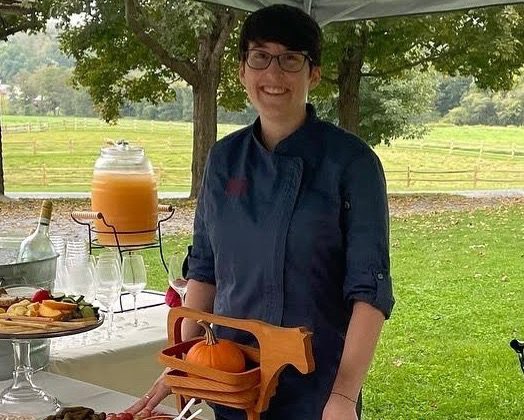
Gray’s love of baking began early. She knew she wanted to be a chef when she was in the third or fourth grade. By the time she entered high school, Gray had begun pursuing her dream in earnest, attending a culinary arts program for all four years. Courtesy of Emery Gay
Gray’s love of baking bloomed early, during long afternoons spent helping her grandmother create delicacies and share them with her family. “It’s very cliche, the whole ‘baking with your grandmother when you were younger’ [story], but it really sparked my love and joy for food,” said Gray. “I knew I wanted to be a chef probably since the third or the fourth grade.”
Gray began pursuing her dream in earnest long before most people have any notion of what their future careers might be, attending a culinary arts program for all four years of high school. By the time she graduated in 2007, Gray had decided to specialize in pastries and began studying at the Culinary Institute of America in Hyde Park, N.Y.
Throughout her journey, Gray has always strived for perfection; the slim margin of error inherent to baking is part of what drew her to it in the first place. “I’m such a rule follower in life that I really love the specific set of instructions and the exact way a recipe has to come together. You have to follow the ratios and the rules,” said Gray. “Pastry requires so much finesse and concentration to create, and I don’t [just want to create]. I want people to sit down and say, ‘That was the best that I’ve ever had.’”
After earning a bachelor’s in business management, Gray’s love of pastries eventually landed her at the Woodstock Inn in 2015. “I love the variety that a hotel/resort setting offers,” said Gray. “You get to challenge yourself in many ways and focus on so many different facets of pastry from making breads to wedding cakes.”
While at the Inn, Gray worked her way up. By the end of her tenure, she had designed the pastry menus for both the Red Rooster and the Tavern. “There were a lot of opportunities there to learn and grow,” she said, “and eventually getting to put my dishes out for people to enjoy was really wonderful.”
After half a decade, however, Gray was ready to try something new, so she hopped over to Billings Farm & Museum. In her new role, Gray oversaw the museum’s cheese production, expanded their food offerings, and taught cooking classes.
 Gray’s love of pastries stems, at least in part, from her love of perfection. The strict rules, tiny margins of error, and specific methods drew her in from the very beginning.
Gray’s love of pastries stems, at least in part, from her love of perfection. The strict rules, tiny margins of error, and specific methods drew her in from the very beginning.
Courtesy of Emery Gray Emery Gray hopes to add wedding cakes to the Von Trapp Lodge’s offerings. Currently, the lodge contracts out all of their wedding cakes, but Gray hopes that she will be able to add their production in 2025.
Emery Gray hopes to add wedding cakes to the Von Trapp Lodge’s offerings. Currently, the lodge contracts out all of their wedding cakes, but Gray hopes that she will be able to add their production in 2025.
Courtesy of Emery Gray Emery hopes to emphasize the lodge’s Austrian heritage in her pastries, while also challenging the boundaries of what makes a traditional Austrian dessert.
Emery hopes to emphasize the lodge’s Austrian heritage in her pastries, while also challenging the boundaries of what makes a traditional Austrian dessert.
Courtesy of Emery Gray Before securing her current position, Gray worked at the Woodstock Inn for half a decade before hopping over to Billings Farm for three years. More recently she spent a year as the assistant pastry chef at an Italian restaurant called Fox & The Knife.
Before securing her current position, Gray worked at the Woodstock Inn for half a decade before hopping over to Billings Farm for three years. More recently she spent a year as the assistant pastry chef at an Italian restaurant called Fox & The Knife.
Courtesy of Emery Gray Courtesy of Emery Gray
Courtesy of Emery Gray Courtesy of Emery Gray
Courtesy of Emery Gray
Gray noted that she felt her position at Billings was pretty close to perfect. “Billings allowed me to use my business degree and grow their food programming from the ground up, which was an incredible experience because I got to be creative. I got to try things and while some things worked and some things didn’t, overall, I really liked it,” said Gray.
However, Gray’s life in Woodstock changed in the wake of the lawsuit filed in early 2023 by members of the Woodstock Foundation Board. Gray says she ultimately decided to leave Billings Farm. “Unfortunately, my moral compass directed me to take a step back from Billings Farm, because I didn’t exactly agree with what was going on,” said Gray. “The minute you lose trust with senior management, I think that’s when it’s time to go.”
Gray has spent the last year working at an Italian restaurant in Boston, called Fox & the Knife, as an assistant pastry chef. “It has been a wonderful year exploring Boston and getting immersed in the culture, creativity, and constant movement,” said Gray. “There are also way more young people in Boston than there ever were in Woodstock, which was kind of shocking at first.”
Although she’s thrilled to come back to the area, Gray did not expect her stay in Boston to end quite so soon. “Moving back to Vermont in 2024 was not on my bingo card at all. But lo and behold, I saw the job advertisement for the Trapp Family Lodge and decided to go for it,” said Gray. “I was very pleased and excited to be offered the position.”
The Lodge, which was founded by the famed von Trapp family immortalized in the “Sound of Music,” maintains close ties to Austria, a relationship which Gray plans to harness. “The challenge and the fun part about that is how to highlight and honor the culture of Austria while also changing the way you think about what a Linzer torte can look like, and what its texture and flavor can be.”
In addition to maintaining some of the lodge’s oldest traditions, Gray is also looking to add a few things to their repertoire. “I’m definitely excited about possibly bringing a wedding cake program to the Trapp Lodge,” said Gray. “Currently [all] of their wedding cakes get contracted out, so being able to get in and introduce wedding cakes, hopefully in 2025, is something that I will strive for.”
Gray, in typical fashion, however, wants to ensure that any wedding cakes she has a hand in are miles beyond average. “Not only does the cake have to look great, but it also has to taste great,” said Gray. “I’ve had lots of wedding cakes that look amazing, but don’t taste so hot. If I can change the culture of wedding cakes, and bring it to Stowe, that would be really special and wonderful.”
At the cusp of such an exciting new chapter, Gray took a moment to emphasize the importance of relishing the moment. “As a chef, I just want to encourage everyone that wherever they go to eat, there’s someone creative behind the scenes putting their heart and soul into a dish that they create,” said Gray. “Someone’s hard work and creativity is on the plate in front of you and it can feel really special to slow down and just sit, enjoy, and savor.”
Sports
April 25
6:55 am
Woodstock Baseball slides to victory on opening weekend
The Wasps Baseball team opened their season at home last Friday, securing their first victory against West Rutland with a final score of 15-5.
The team pulled off a successive home victory on Saturday, closing out the opening weekend with an 8-4 win vs. the Leland & Gray Rebels.
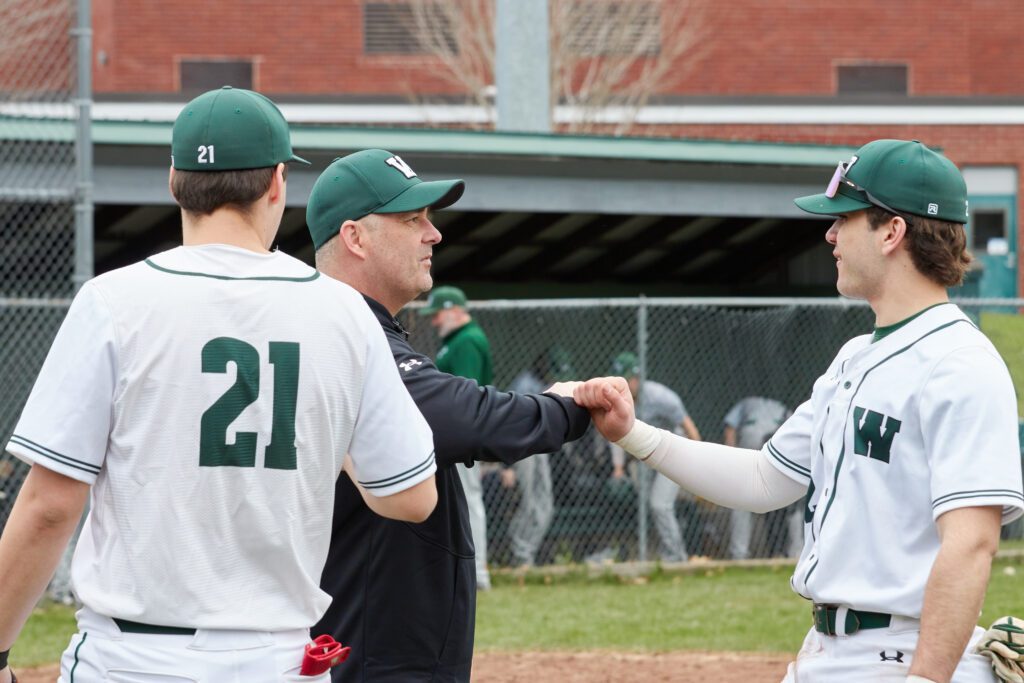
Coach Jason Tarleton offers fistbumps to Vincent Petrone and Jacob Stone.
Robert Shumskis Photo
April 25
6:54 am
Wasps spring into action
Monday was a packed day for Woodstock sports teams. The boys and girls lacrosse teams continued to set the tone for their seasons in their games against Burr & Burton and Hartford, while girls tennis walked away with a 5-2 victory over Rutland at home.
Girls lacrosse was just shy of securing a victory but ultimately lost 11-10 to Burr & Burton Academy, who had the home-field advantage.
The boys team walked away with a win, defeating the Hartford Hurricanes 11-10 at their match in Hartford.
Video features
April 25
5:30 am
Interview with Woodstock Planning and Zoning Director Steven Bauer
Obituaries
April 25
6:55 am
Beverly Jane (Smith) Herrick
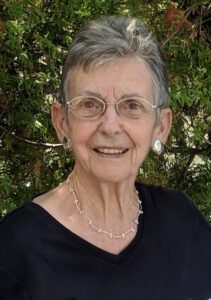 Beverly Jane (Smith) Herrick, a true warrior and beloved by all who knew her, passed away at the McClure-Miller Respite House on Friday, April 12 after battling both neuroendocrine and lung cancer for years. She was 84 years old. The family thanks the staff at the Respite House for their support and the tenderness with which they cared for Beverly in her last days.
Beverly Jane (Smith) Herrick, a true warrior and beloved by all who knew her, passed away at the McClure-Miller Respite House on Friday, April 12 after battling both neuroendocrine and lung cancer for years. She was 84 years old. The family thanks the staff at the Respite House for their support and the tenderness with which they cared for Beverly in her last days.
Beverly was born on October 7, 1939 in Hanover, N.H. to Wardie and Doris Smith (Horton). Beverly’s early years were spent in Keene, N.H. where she attended a one-room schoolhouse. She had fond memories of walking to a house nearby, pulling a wagon in the spring and fall and a sled in the winter, to retrieve the hot lunches made for the students by the woman who lived there.
Beverly’s family later moved to Taftsville, where Wardie worked as a mechanic and night watchman. Beverly attended Woodstock High School where she excelled academically, played snare drum in the marching band and was crowned homecoming queen her senior year. Upon graduating in 1957, Beverly declined an offer to have college paid for her by a local family and instead chose to take a job as secretary to the principal of Woodstock High School. It was here that she met the love of her life, John B. Herrick, who had just taken a teaching job at the school. They were married six months later and had two children.
Work brought the young family to Burlington, where John taught at Edmunds Middle School. Beverly worked many years for the Chittenden Bank in downtown Burlington and made many close friends. After retiring from the Chittenden, she worked at City Drug and volunteered for years for both The Fletcher Free Library and the Ethan Allen House, both in Burlington. Beverly was a regular supporter of the VT Food Shelf and the VT Young Writer’s Project. She wasn’t a joiner — with the exception of her bowling league — but enjoyed hosting get-togethers with family and friends as well as reading, gardening, walking, and exploring Vermont. She was fiercely independent and cared for her husband during his battle with Alzheimer’s and Cancer right up until he died. Her love for him was unconditional and inspiring.
Beverly is predeceased by beloved husband John. Many fun times and memories were made during their long marriage. They had two children who are forever grateful to have had such loving, supportive, and accepting parents. She was also predeceased by her parents and her sister Margaret Wilson. She leaves behind her children, Laurinda Hulce and her husband, Barry; her son, Christian Herrick; and her grandchildren: Zoe Hulce, Gwynevere Hulce, Ethan Herrick, and Zander Herrick. She also leaves many other beloved friends and family members both near and far.
The family would like to thank Leon Emmons and his wife Linda for their support of Beverly over the years, especially since the death of her husband John, who Leon had been friends with since they were both 5 years old.
Special thanks also to Beverly’s niece and lifelong friend, Lois Silva, who spent the last few days of Beverly’s life with the family at the Respite House and provided more support than can be put into words.
Beverly will be forever missed. A small graveside service will be held at a later date to fulfill Beverly and John’s wish that their ashes be combined and then buried at Lakeview Cemetery on North Avenue in Burlington.
The family asks that donations honoring Beverly be made directly to either the Chittenden County Humane Society, The Vermont Foodshelf, or the McClure-Miller Respite House. Please visit awrfh.com to share your memories and condolences.
April 25
6:55 am
Dennis Raymond Carroll
Dennis Raymond Carroll was born on July 4, 1942 in Rahway, N.J., to Frank Joseph Carroll and Hildur Margaret Carroll. He was called back to God on April 9, 2024 in Cathedral City, Calif., surrounded by the loving support of his wife, Carol Carroll, son, Matt Carroll, sister Alice Thompson, niece Peggie Jimcosky, and nephew, Scott Thompson. He is also survived and will be missed by his nieces Elizabeth Condren and Jennifer Barga; nephews Sean Condren, Hilary Condren, and Colin Condren; all their wonderful families, and his many great friends, former students, and colleagues.
Dennis graduated from Seton Hall University, with a degree in Classics, in 1964, and began teaching high school English and Latin in Governor Livingston, N.J.
On Aug. 3 of 1969, Dennis married Carol Condren. It was apparently such a case of true love that she gladly changed her name to Carol Carroll. Dennis and Carol had an amazingly wonderful, loving marriage, filled with joy, laughter, kindness, and goodness. They were soulmates in the purest sense and their marriage lasted fifty-four years. On November 10th of 1973, they welcomed their only son, Matt, and the three of them had fifty glorious years as a loving, very happy family.
A naturally charismatic and gifted teacher, Dennis devoted his career to education. He and Carol moved to Woodstock in 1977 and both taught at Woodstock Union High School. They loved their years in Woodstock, where Dennis eventually transitioned into administration and the position of Vice Principal. In 1986 Dennis moved to Long Island, N.Y., with Carol and Matt, and became the Middle School Director for Woodmere Academy, in Woodmere, N.Y. He went on to serve as the Upper School Director, for the newly named Lawrence Woodmere Academy and in 1994 he became the Headmaster. He served as Lawrence Woodmere Academy’s Headmaster for nine years and both loved and took great pride in that responsibility. He also formed close friendships with coworkers, parents, and students that endured the rest of his life. After retiring to Palm Springs with Carol in 2004, he continued to teach on a part-time basis at College of the Desert.
Inspired by an insatiable appetite for life, Dennis devoted himself to his loved ones and was always there when one of them needed support. He had a wonderful sense of humor, loved to make people laugh, and was known for his own hearty, genuine, and unrestrained laughter. Dennis and Carol both gave generously of their time and energy to their church communities in Vermont, New York, and most recently at Our Lady of Solitude in Palm Springs.
Special thanks to Our Lady of Solitude, where the funeral service will be held on Saturday, May 18th at 12 p.m. And a world of gratitude to the gifted and generous care providers at The Palms at La Quinta.
Please honor Dennis’s memory with kind acts toward others, the indulgence of laughter with family and friends, and perhaps a remembrance to a favorite charity of your own.
April 25
6:55 am
Joan Marie (Boutilier) Allen
Joan Marie (Boutilier) Allen, 77, died Friday, April 19, 2024, at home in Reading with her family by her side.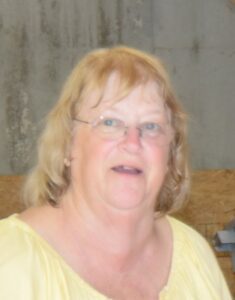
She was born August 8, 1946, in Windsor, VT, the daughter of William and Kathleen “Kitty” Boutilier. Joan grew up in Windsor and attended Windsor schools. She was married to Robert Allen, and they made their home in Reading where they raised their three children until later divorcing.
Joan worked at the Kedron Valley Inn in the kitchen and then as a housekeeper for the Lutz family for over twenty-five years until her health no longer allowed her to work. She met Paul Seaver on March 16, 1979, and they have lived in Reading as life partners for the past forty-five years.
Joan was a member of the Reading Fire Department Auxiliary for many years, but most of all loved being with family and friends, especially her grandchildren.
She is survived by her partner, Paul Seaver of Reading; children Kevin Allen (Pam) of Manchester, NH, Kim Allen, and Curt Allen (Kate) both of Reading; grandchildren Darren, Nicholas, Alexis, Anthony, and Brody; brother Richard Boutilier of Windsor; and nieces and nephews.
She was predeceased by her parents and a sister-in-law, Anita Boutilier.
A graveside service will be held at the Felchville Cemetery in Reading on Friday, May 3 at 1 P.M.
Condolences may be made to Joan’s family in an online guestbook at knightfuneralhomes.com.
Contributions in her memory may be made to St. Jude Children’s Research Hospital, 501 St. Jude Place, Memphis, TN 38105, or at stjude.org.
April 25
6:50 am
Helen Marie Curtis
 Helen Marie Curtis, a vibrant soul who touched the lives of many, peacefully passed away on April 7, 2024 in Southbury, Conn. Born on Jan. 17, 1946, in Denver, Colo. to father Charles A. Curtis and mother Marie (Schutte) Curtis, Helen’s journey was one of love, laughter, and boundless exploration.
Helen Marie Curtis, a vibrant soul who touched the lives of many, peacefully passed away on April 7, 2024 in Southbury, Conn. Born on Jan. 17, 1946, in Denver, Colo. to father Charles A. Curtis and mother Marie (Schutte) Curtis, Helen’s journey was one of love, laughter, and boundless exploration.
A cherished daughter, mother, sister, grandmother, aunt and friend, Helen leaves behind a legacy of kindness and strength that will forever echo in the hearts of those she held dear. She is survived by her daughter Lisa Paccione and wife Melissa Robbins of Chicago; son James Paccione and wife Tracy Paccione of Southbury, Conn.; the father of her children, Dale Paccione; her loving sisters Chris Ertel of Sante Fe, N.M., and Julie Ward and husband John Ward of Portland, Ore. Helen’s adoration extended to her grandchildren, Brynn and Tyler Paccione, as well as numerous nieces and nephews. She is preceded in death by her longtime partner, Thomas E. Singer, of Woodstock, Vt., with whom she shared many treasured memories.
Helen was known for her generous and kind nature, as well as being strong-willed and principled. She was a multi-talented individual who excelled in various aspects of her life. She thrived in academia, earning an undergraduate degree in Mathematics and Education from Merrimack College, a graduate degree in Mathematics and Education from Bridgewater State University, as well as an MBA from Simmons College. Her professional journey spanned from engineering at ATT to nurturing young minds as a high school math teacher and a math editor at Houghton Mifflin. She even found joy in crafting hand-knit treasures for children through her own venture, Abundancia. Until her death, she continued to dedicate herself to education, working part time as a standardized patient — simulating medical scenarios for first year medical students — at the Geisel School of Medicine at Dartmouth.
But beyond her achievements, Helen was an adventurer at heart. She began as a child, traveling often from Boston to Denver by train to spend time with her grandmother and cousins. She grew to travel the globe, from hiking the glaciers of Alaska, traveling to Kenya to photograph an eclipse, to walking with penguins in Antarctica as well as exploring portions of New Zealand, Australia and Europe.
Tennis and winter retreats to Punta Del Este, Uruguay, were among her favorite pastimes, where she reveled spending time with her many friends and visitors. Her zest for life led her to celebrate her 60th birthday with a family hike to Machu Picchu, a testament to her adventurous spirit and family connection. Her adventurous nature wasn’t limited to globetrotting. From summers spent at Humarock Beach in Massachusetts in her youth to earning her membership to the 251 Club of Vermont with friends, she embraced every opportunity for exploration and discovery, finding beauty and joy close to home.
Helen had a passion for art and enjoyed drawing and painting with her friends. As an amateur artist, she entered her work in local art expeditions and won some accolades. Fearless by nature, she submitted and had one of her portraits included in a community project that was part of “The Obama Portraits Tour” exhibit at The Museum of Fine Arts, Boston (BFA).
A lifelong devoted fan of the Boston Red Sox, Helen’s unbridled passion for baseball was a bond she shared with her sister Julie through endless commentary and playing spirited games of Baseball Bingo over the Internet during the Sox games.
Her commitment to community service was unwavering, she served on the Board of Directors at the Woodstock Food Shelf and was a longtime member of the library’s arts committee.
A celebration of Helen’s life will be held in Vermont in the coming months. In lieu of flowers, the family kindly requests donations to The Woodstock Community Food Shelf (PO Box 570, Woodstock, VT 05091) or the Thompson Senior Center (99 Senior Lane, Woodstock, VT, 05091), in honor of Helen’s compassionate spirit. Though she may have left this world, Helen’s grace, intelligence, humor, and warmth will forever remain in the hearts of those who were privileged to know her.
To leave an online condolence please visit munsonloveterefuneralhome.com.
April 25
6:50 am
Robert McElwain
 Robert McElwain died on April 3, 2024 at his home in Woodstock, following a period of declining health.
Robert McElwain died on April 3, 2024 at his home in Woodstock, following a period of declining health.
Bob was born in Kalamazoo, Mich. on Sept. 17, 1937. He grew up in Cincinnati and then attended the University of Michigan where he received a BA (1960) and an MBA (1963).
Michigan and its sports would remain an abiding love for Bob throughout his life (Go Blue!).
He worked in the world of finance in New York and Chicago until a classic mid-life crisis led him and his family to Grafton, Vt. in 1974. After a few years, his wife and children returned to Chicago but Bob remained in Vermont — a state he loved and where he felt at home. Although they did not live in the same place, Bob continued to have a loving and strong relationship with his children and later his grandchildren who all helped to make his life so special.
In 1977 Bob founded Bike Vermont an inn-to-inn bicycle touring company. The best possible fringe benefit he always said was that Fiona MacDonald came down from Toronto to join a tour and impetuously asked him to marry her. They have been happy ever since.
After fifteen years, the business was sold and Bob and Fiona spent the next thirty years traveling the world, walking on beaches, and working in their ever-expanding gardens in Woodstock. Bob was a voracious reader, a fan of many sports, particularly baseball, a lover of country music, and a keen player of cribbage.
He derived much pleasure from the many hours he spent volunteering at Dartmouth Hitchcock Medical Center, the Woodstock Community Food Shelf, and the Naples Botanical Garden. He was an active friend of Bill W. for the past thirty-two years.
He is survived by his wife Fiona and his three children: Beth McKenna (Dave), Amy Strickland (Dave), and Robert McElwain (Secil), and his six grandchildren.
At his request, there will be no service, but at a later date, there will be gatherings of friends and family to remember Bob.
Donations in Bob’s name may be made to the Woodstock Community Food Shelf or the Norman Williams Public Library.
Bob’s family would like to thank Bayada Hospice for their compassionate help and support over the last four months.
The Cabot Funeral Home is assisting the family (cabotfh.com).
Annual Appeal
April 25
5:32 am
Now it’s official -- IRS approves Journalism Foundation as public charity, donations are tax deductible
By Dan Cotter, publisher
A huge sigh of relief and a fist pump were my first reactions, as well as a gaze skyward as I mouthed the words “thank you!” The tears welling up in my older friend’s eyes were his response when I told him.
Then we shared a long, hard hug.
After lots of research and preparation, and then six months of waiting for the application to be processed, Phil Camp and I recently learned that the IRS has approved the Woodstock Region Journalism Foundation’s application for tax-exempt status under section 501(c)(3) and deemed the Foundation to be a public charity.
The approval wasn’t in much doubt, really. But now it’s official.
The Foundation was established last August and it is primarily dedicated to preserving the Vermont Standard and its role in informing citizens and supporting democracy in our area well into the future. The Foundation has a board made up of local residents who care deeply about our community and the value local journalism provides. Phil and I are on the board too. Together, we’re working to keep the 171-year-old Vermont Standard going while taking steps to position the paper’s print and digital journalism for long-term sustainability.
Recognizing the critical role the Standard plays in informing and connecting our community, this Foundation wants to avoid letting our area become a “news desert,” as has happened in hundreds of other places throughout the US in recent years. Newspapers like the Standard are currently dying off at a pace of 2.5 per week. Nor do we want to end up like the hundreds of cities and towns where profit-seeking corporations that have no devotion to the public welfare have acquired their local paper and stripped it of its resources, to the point that it is only a pathetic shadow of its former self and incapable of doing its job.
Providing accurate, credible, reliable news and information to its audience is a local news organization’s primary role. A functioning democracy requires an informed, engaged public. The Woodstock Region Journalism Foundation’s board members, advisors and friends will help Phil and I in our mission to raise enough money to keep quality journalism flowing here.
So, I’m glad to report that any donation you’ve made to the Woodstock Region Journalism Foundation to support the Standard’s mission to inform, connect, and educate our community on issues of public importance is indeed tax-deductible dating back to the inception of the Foundation in late August 2023, as all donations will be going forward.
At 88 years old, Phil feels a real sense of urgency about making sure that our community will always have local journalism – especially given the 40+ years he’s dedicated to leading the paper and his unrivaled love for Woodstock and its surrounding towns. We know we’re in a race against the clock. But now, with the Foundation’s charity status and your tax deduction confirmed, we hope there will be even more support from donors and family foundations that will help us accomplish this very important mission.
Thank you from the bottom of our hearts for your encouragement and generosity. If you would like to contribute to our Annual Appeal, please send us a check at PO Box 88, Woodstock, VT 05091, or go to our Vermont Standard THIS WEEK website at https://thevermontstandard.com/annual-appeal/ to make a contribution with your credit card. Please be sure to make your check out to the “Woodstock Region Journalism Foundation.”
April 25
5:30 am
Making friends while trying to make ends meet
By Dan Cotter, publisher
Friendship. That’s what I’m thinking about as I publish this year’s fourth and final annual appeal article.
Of course, that makes perfect sense given our heritage.
If you’ve ever seen longtime Vermont Standard icon Phil Camp in action as he walks down Central or Elm Street, or when he’s seated near the fireplace at the Woodstock Inn, you know what I’m talking about. I nicknamed him the “Unofficial Mayor of Woodstock” because, like a campaigner, he seems to want to talk to everyone he encounters, whether it’s an old friend (he’s got quite a few, as he’s lived here almost 88 years) or a visitor from wherever. His opening line with those visitors — after complimenting them on their cute child or puppy — is “where are you from?” After giving them a warm welcome and trying to get to know them better, he typically tells them a little more about our area and then a lot about the Vermont Standard. He always closes these brief exchanges by encouraging them to check out our Vermont Standard THIS Week website or buy an eEdition subscription so that they can keep up with our beautiful Woodstock area after they return home.
It’s as though he was commissioned by the Chamber of Commerce, but really, he just likes to make friends.
And he does. On occasion he even hears back from folks he’s greeted, thanking him for being one of the highlights of their recent visit.
Likewise, if not for the friends we’ve made, the Standard, like so many other newspapers around the country, would have closed up shop at some point in the past few years after losing access to such a large portion of the advertising dollars that traditionally supported community journalism. Thankfully our readers stepped up to fill the gap with their donations. Thanks to them — our friends — we’re still alive and striving to do our best, and I am still able to write this to you today.
We may have struggled to make ends meet, but we have been able to make some good friends. And that’s a blessing.
I’m reminded of Carole King’s song, “You’ve Got a Friend”
If the sky above you
Grows dark and full of clouds
And that old north wind begins to blow
Keep your head together
And call my name out loud
Soon you’ll hear me knockin’ at your door
Some of our friends seemingly came knockin’ out of nowhere to support us, to support our community by preserving its journalism and to support its democracy. They asked for nothing in return, not even for recognition. We are eternally grateful to them. We hope to make them proud, and we hope they’ll continue to have our back. And we hope we’ll continue to meet new friends along the way.
Four special friends have now come together to serve on the board of the new Woodstock Region Journalism Foundation: Charlie Shackleton, Darlyne Franzen, Rob Wallace, and Bill Emmons. As I announced a few weeks ago, the Woodstock Region Journalism Foundation, which is dedicated primarily to preserving the Standard and its role in informing citizens and supporting democracy in our area well into the future, has formally filed an application for recognition of tax-exempt status with the Internal Revenue Service. These Foundation board members believe in us and they care deeply about our community and the value the Standard provides. Right now, they are encouraging their own friends to support this important cause at this critical juncture.
If you’re willing to make a donation to the Woodstock Region Journalism Foundation, your contribution will be utilized in the form of project grants to support our mission to inform, connect, and educate our community on issues of public importance. Contributions will be tax-deductible dating back to the inception of the Foundation.
Winter, spring, summer or fall
All you have to do is call
And I’ll be there, yes, I will
You’ve got a friend
You’ve got a friend
Ain’t it good to know you’ve got a friend
Indeed, it is good to know that you’re all our friends. So many community newspapers throughout the U.S. are braving their final hour. But, especially with the establishment of the Woodstock Region Journalism Foundation, we’re hoping that the Vermont Standard is now embarking on its finest hour, hand in hand with you, our friends.
To make a donation, please send us a check at PO Box 88, Woodstock, VT 05091, or go to our Vermont Standard THIS WEEK website at www.thevermontstandard.com to make a contribution with your credit card. Be sure to make your check out to the “Woodstock Region Journalism Foundation.”
UPDATE: The IRS has approved the Foundation’s application for nonprofit status, so your gift will be tax-deductible.

April 25
5:29 am
Let’s not lose our sense of place
By Dan Cotter, publisher
The main thing I remember is that it was always loud. And a bit chaotic.
With seven children all just a year apart, there tended to be a lot of clamor and teasing as we’d prepare the dinner table in our house where I grew up. Dad was home from work and it was time to eat!
This ritual took place more or less every day. Everyone had scattered to work and school and sports, part-time jobs, and all sorts of other activities throughout the day, but in the evening, we gathered for the one meal we ate together and to talk about what was going on. It was there around that table — where elbow space was at a premium — that we learned of each other’s latest achievements, trials, and disappointments, laughed at each other’s tales from the front, the foibles we had experienced or witnessed that day, found out about what’s coming up for the family, including challenges we faced, and on so many occasions, after expressing our opinions about one thing or another, we engaged in fierce debate.
Sure, we spent moments with a parent or certain siblings during the day and we picked up bits and pieces of information or gossip along the way, but it was at the dinner table that we could count on hearing the straight story from our parents and each other. There, as we kept up with our family’s day-to-day news, we also strengthened our bond.
Of course, the dining experience is probably a little different for families these days. Households tend to be smaller and parents’ work schedules aren’t as predictable. Plus, with all of the activities children participate in that cut into mealtime, it may not be possible for some families to gather together on a daily basis. The catching up and bonding may take place on a more infrequent basis or in a different setting, but it’s just as important nonetheless.
Having a regular, ongoing opportunity to share news and information that we and only we are truly interested in gives everyone the sense that they’re in the know and an important member of the family. It helps us create our shared identity.
I think it’s pretty much the same in a small community like ours.
Technically, just by virtue of living here, everyone is part of the community. However, it’s the access to our own news and information — that regular habit of keeping up with what’s going on among us – that nurtures our sense of belonging, our shared identity, and it helps give our community its sense of place.
When we are able to better know each other, and know more about our local businesses and organizations, our history and traditions, and all the constantly-changing issues and narratives that are playing out in our community, we can truly feel connected and at home in this unique place and we can participate in our community better.
For example, in our community, and only in this particular community, the Wasps are both the king and queen when it comes to sports. Issues such as retiring public servants, accommodations for tourists, proposed new schools, and short-term rental regulations are headline news here. We have our very own natural disasters to contend with, as well as the local controversies and court cases everyone is following. We have a multitude of entertainment offerings to keep abreast of. We have people who are well-known and admired here, and there are always examples cropping up of ordinary people doing extraordinary things here that we like to hear about. Plus, we gather each year to vote on local candidates and topics that affect us personally, financially and emotionally. And people here certainly aren’t afraid to express an opinion and have a debate from time to time.
All of those concerns are an integral part of life here. Our community’s identity then, is more than just a collection of pretty towns surrounded by farms and lush, rolling hills. It’s actually our shared interests and experiences that give this community its true sense of place.
I liken the Vermont Standard to the “dinner table” of my youth, where we gather to keep up on things that are of interest to this community. Our reporters collect that news and information and we package it, deliver it, and make it possible for all of us to digest it each week so that we come away more informed and hopefully knowing and feeling a little closer to each other. In this way, we can more fully embrace our collective experience and be ready to participate, armed with a common, credible set of knowledge. Like with a family at mealtime, our shared identity is strengthened and we’re all better off.
I hope you’ll consider joining our mission as we scramble to keep the Standard going despite the financial pressures that threaten its survival. We’ve got a large — though not insurmountable — operating deficit to overcome, and we just can’t keep this up without significant help. Our hope is that you agree with us that our local journalism is nourishment for our community and worthy of your investment. We hope you’ll make a donation to our 2023 Annual Appeal, and even better, consider adding us to the organizations that you make donations to each year so that we can achieve some staying power. If you own a business, we hope you’ll consider advertising with us as well.
Some good news is that last month, the Woodstock Region Journalism Foundation was created. The Foundation, which is dedicated primarily to preserving the Standard and its role in informing citizens and supporting democracy in our area well into the future, has formally filed an application for recognition of tax-exempt status with the Internal Revenue Service. The Foundation has a board made up of local residents who care deeply about our community and the value the Standard provides. Phil Camp and I are on the board too. Together, we’ll work to continuously improve the paper’s print and digital journalism, and position it for long-term sustainability.
If you’re willing to make a donation to the Woodstock Region Journalism Foundation, your contribution will be utilized in the form of project grants to support our mission to inform, connect, and educate our community on issues of public importance. Contributions will be tax-deductible dating back to the inception of the Foundation.
To make a donation, please send us a check at PO Box 88, Woodstock, VT 05091, or go to our Vermont Standard THIS WEEK website at www.thevermontstandard.com to make a contribution with your credit card. Be sure to make your check out to the “Woodstock Region Journalism Foundation.”
UPDATE: The IRS has approved the Foundation’s application for nonprofit status, so your gift will be tax-deductible.

April 25
5:28 am
We’re betting on this community, at this time, for this mission
By Dan Cotter, publisher
If not us, who? If not now, when?
These soul-searching questions have been pondered by leaders throughout history when faced with situations that required great courage and determination. In fact, longtime Vermont Standard publisher Phil Camp and I asked ourselves those same questions several years ago as we embarked on our mission to preserve quality local journalism for Woodstock and its neighboring towns, including Hartland Pomfret, Barnard, Quechee, Bridgewater, Reading, West Windsor, Plymouth and Killington. We were inspired by those questions as we set out to save the Standard’s print and digital journalism that informs and connects our community even though the advertising revenue that has supported the paper through the years has diminished.
Just like other newspapers in large and small towns throughout the country, the Standard has been fighting for its life. Similar to everywhere else, advertising revenue is evaporating as smaller, independent retailers and service providers that traditionally supported local news organizations with their ads have been replaced by chains, big box stores and online sellers that typically do not support community journalism. And many classified advertisers now use dedicated help wanted, auto, and real estate websites instead of a newspaper. Plus, the residual effects of the COVID-19 economic shutdown have further eroded many businesses’ advertising budgets.
Without sufficient advertising support, the Standard, like all newspapers, relies heavily on the public to help fund its local journalism. And that journalism is needed now more than ever in a society dominated by social media echo chambers, political and social division, and the proliferation of misinformation. Still, the Standard’s situation is dire. If not for contributions from philanthropic citizens who fully recognize the value of having local journalism in our community, the paper would lose several thousand dollars each week, and sadly — after a 170-year run — there would be no Vermont Standard.
Saving this one small newspaper in Vermont is obviously important to the community here, but it also has national implications. Papers like the Standard are dying off at a pace of two per week. And far too many newspapers that are still alive have been acquired by corporations that have stripped them of their resources, turning them into “ghost papers” that are unable to adequately inform and serve their communities.
Most newspapers are on the brink of insolvency. We must find a way in this country, both collectively and individually, to keep credible local journalism alive, to keep citizens informed and connected. Our democracy depends on it.
The Standard is symbolic of this problem our nation faces. But if there is any place in the country where people truly love their community and treasure their newspaper — which is still produced by a small but devoted staff trying to do the right thing — it’s Woodstock, VT. If this community can’t find a way to sustain its local journalism, there is probably little hope for the rest.
Unlike most other newspapers, the Standard, which already operates on a shoestring, has resisted the strategy of further stripping down its small operation to bare bones. Instead, we are attempting to preserve it as a quality newspaper that can continue serving our community well.
Phil always maintained that the Standard actually belongs to the community. He’s right, and it’s in their hands now. If local journalism can indeed be saved, it will happen here, where citizens are so engaged and appreciation for the Standard is so strong.
If not us, then who? If not now, then when?
We’ve made significant progress. Last month, the Woodstock Region Journalism Foundation was created. The Foundation, which is dedicated primarily to preserving the Standard and its role in informing citizens and supporting democracy in our area well into the future, has formally filed an application for recognition of tax-exempt status with the Internal Revenue Service. The Foundation has a board made up of local residents who care deeply about our community and the value the Standard provides. Phil and I are on the board too. Together, we’ll work to continuously improve the paper’s print and digital journalism, and position it for long-term sustainability.
We hope you’ll take a moment to make a donation to the Woodstock Region Journalism Foundation. Your contribution will be utilized in the form of project grants to support our mission to inform, connect, and educate our community on issues of public importance. Contributions will be tax-deductible dating back to the inception of the Foundation.
Your contribution has the potential to make a real difference – to save our paper and give us a chance to put in place initiatives that ensure our long-term sustainability, to draw attention to the loss of quality local journalism across the country, and to motivate others to advocate for solutions to this crisis before it is too late.
If you’re willing to make a donation to our 2023 Annual Appeal, please send us a check at PO Box 88, Woodstock, VT 05091, or go to our Vermont Standard THIS WEEK website at www.thevermontstandard.com to make a contribution with your credit card. Be sure to make your check out to the “Woodstock Region Journalism Foundation.”
UPDATE: The IRS has approved the Foundation’s application for nonprofit status, so it’s confirmed that your gift will be tax-deductible.
![]()
April 25
5:28 am
Since no news would be bad news, here’s some good news

By Dan Cotter, publisher
Anyone keeping track has probably noticed that the Vermont Standard’s annual appeal is starting late this year. In the past, I’ve written a series of four columns in August-September to let you know how we’re doing in Phil Camp’s and my quest to keep our local journalism viable for Woodstock and its neighboring towns. Here we are now at the end of September and I’m finally getting back to you!
Still, I think the message I have to share today is one worth waiting for.
Everybody knows by now that newspapers all throughout the country have been hanging by a thread. The Standard is no different. In the past, I’ve described our financial challenge to you here in the pages of the paper and Phil and I have met with a number of you personally to discuss the mission we’re on to try to ensure that the Standard continues to keep citizens here informed and connected well into the future, despite the loss of much of the traditional newspaper advertising revenue that supported local journalism in communities like ours for the past hundred years. We think that the public service newspapers like ours perform is critical to the health of our American democracy, and we believe that our community would be greatly diminished if we’re not successful in our quest to rescue the Standard.
Just ask the more than 20 percent of Americans who now live in communities that have no trustworthy, in-depth, or independent news source reporting on their local issues.
About 2,500 newspapers around the country have gone out of business in the past 20 years, and many, many of those that still exist are now just a shadow of their former selves, as corporate scavengers have acquired them and stripped them of their resources, leaving them alive but emaciated and wholly incapable of performing their duty to their community.
We’re not trying to merely keep some semblance of a paper alive here. We’re trying to preserve a good, independent, 170-year-old purveyor of local journalism (both in print or digital formats) that our community can continue to trust, rely upon, and be proud of.
And we are clearly not alone on this journey. For the past few years, increasing numbers of those who read and care for the Vermont Standard have pitched in to offer assistance. We’ve received donations and significant financial support from people who believe that having fair-minded, professionally produced, independent local journalism is extremely important to the quality of life here, and it’s a safeguard against sources that may otherwise spread misinformation and even disinformation in the community.
All of these angels who helped us did so with no expectations other than that we’d continue to do our best to inform, entertain, and connect the community we exist to serve. They did it out of their love for Woodstock and the neighboring towns that make up our community. Without even the benefit of a tax deduction.
Five years ago, wise friends of the Standard advised Phil and me to explore whether the paper could be operated by a nonprofit entity – which would enable it to receive tax-deductible contributions from donors and apply for grant funding. At the time, prospects for that route didn’t look promising. But with the ongoing counsel of those friends and others who have assisted us along the way, we have now identified and set out on a path forward that we hope will lead to the approval of a new 501(c)(3) organization to operate the newspaper.
This month, the Woodstock Region Journalism Foundation was created. The Foundation, which is dedicated primarily to preserving the Standard and its role in informing citizens and supporting democracy in our area well into the future, has formally filed an application for recognition of tax-exempt status with the Internal Revenue Service. The Foundation has a board made up of local residents who care deeply about our community and the value the Standard provides. Phil and I are on the board too. Together, we’ll work to continuously improve the paper’s print and digital journalism, and position it for long-term sustainability.
Now you can make a donation to the Woodstock Region Journalism Foundation and your contribution will be utilized in the form of project grants to support the Vermont Standard’s mission to inform, connect, and educate our community on issues of public importance. Contributions will be tax-deductible dating back to the inception of the Foundation. Of course, we recommend potential donors discuss with their own advisors any specific questions about their particular contributions.
We are very excited about this development, and we hope that more people will now be willing to support the Standard with a donation, and perhaps past donors will even consider increasing their contribution. For those who have family foundations, we hope that you’ll consider adding the Woodstock Region Journalism Foundation to the causes you regularly support.
Our need is quite urgent, to say the least. After many months of preparation, we are certainly pleased to now be in this position, but we’re late getting started with our annual appeal and we’ve incurred additional expenses to set this up, so that thread we’re clinging to is awfully frayed right now. We are profoundly grateful for anything you can do right away to help us get on firmer financial footing.
If you’re willing to make a donation to our 2023 Annual Appeal, please send us a check at PO Box 88, Woodstock, VT 05091, or go to our Vermont Standard THIS WEEK website to make a contribution with your credit card. Be sure to make your check out to the “Woodstock Region Journalism Foundation.”
UPDATE: The IRS has approved the Foundation’s application for nonprofit status, so your gift will be tax-deductible.
April 25
5:00 am
Hard to imagine Woodstock without the Standard
“View From Here”
By Sandy Gilmour, Woodstock resident
If you are reading this column right now, that’s good news for the community. It means you probably paid for this paper, hard copy or online, maybe even made a donation to it, and value its contribution to our lives in Woodstock and surrounding areas. We are so fortunate to have the Vermont Standard week in and week out. For years, small-town dailies and weeklies have been closing their doors, leaving communities without a soul. Papers like the Standard are dying off at the rate of two per week across America.
Such towns are called “news deserts.” Imagine weeks, months and years going by with no professional reporting on selectboards, trustees, school boards, taxes and roads. Zero stories about public school events, sports, student accomplishments, obituaries, gardening tips, neighborly cooking advice, local history, and no reports from towns from Brownsville to Pomfret.
We would know next to nothing about the interminable Peace Field Farm restaurant delay, the Ottauquechee Trail head fiasco, the high-stakes Woodstock Foundation controversy and the fatal shooting off Central Street, including the bravery of Woodstock Police Sgt. Joe Swanson. In my view, these stories have been really well reported.
To not get these stories delivered to us every week would be a news desert right in verdant Woodstock, for sure, a gaping hole left to be filled by rumor and mis- and dis-information, the precursors of community dissolution. So we are blessed indeed to have had the Vermont Standard around — nonstop — since 1853, and owned by beloved Woodstocker Phil Camp, now 87, since 1981.
But as Mr. Camp has pointed out many times over the years, the paper’s solvency hangs on a thread and now more than ever. In hundreds of towns across America, owners, beleaguered by losing subscribers and advertising to social media, simply folded or sold out to hedge funds and private equity firms, whose investors are bereft of community values. Not Phil Camp. He has always said, “I never sold out. I’m never giving up.” He made up for past deficits (difference between expenses, like staff, and income from subscriptions and ads) out of company savings from better times, week after week. He stayed with it after being flooded out by Tropical Storm Irene in 2011 and being burned out by the Central Street fire of 2018 (taking out his camera and snapping photos of the flames and rubble).
The paper was in dire straits when COVID hit, saved by the forgiven federal PPP (Paycheck Protection Program) loans through 2021, when the largesse ended. Then beginning in January 2022, the community stepped up, responding to a fundraising appeal. I was rather stunned to learn from the Standard’s publisher, Dan Cotter, that the paper’s annual shortfall of $150,000-$200,000 is being covered by donations from local Woodstock residents. There are many (and appreciated) donations in the $50-$100-$200 range, but really heavy lifting is being done by donors of means who, Mr. Cotter says, highly value the contribution local journalism makes to communities. Several of these more-than-generous and anonymous donors contribute $20-25,000 and more — each — and, Mr. Cotter says, without any hint of trying to influence coverage. Without them, surely there would be no Vermont Standard in the mailbox or online, just the unreliable grapevine. At the same time, the paper is moving to create other revenue streams, including an online advertising app for Woodstock happenings and a magazine, in addition to improving thevermontstandard.com website for go-to news.
Still, the operation is bare bones. It seems to me a miracle the paper “hits the streets” without fail every Thursday with some pretty good and important stories that we need to know about, and many features that are good to know about. And there are just two, count them, two, full-time staffers who report stories: the seasoned and prolific Tom Ayres, and Tess Hunter, who is also the managing editor. Ms. Hunter says reporter staffing is the big issue; she has on hand freelance contract reporters that can be assigned to stories if they are available and if they want to spend the evening at yet another unexciting if important selectboard meeting. “It’s a constant juggling act,” Ms. Hunter told me, “between finding the right person for the story and just getting people to say ‘yes.’” Still, she is committed, saying, “Without us making the attempt, there would be no common base of understanding and little sense of the community spirit of the area or the hard news happening within it.”
Volunteer contributors are crucial; regular community writers like Jennifer Falvey (insightful musings on life) and Kurt Stauder (pointed political observations) are popular. Mary Lee Camp’s business column is relentlessly informative.
Other key staff are listed in the box below — lean and spare!
Publisher and editorial content director Dan Cotter, 64, hired by Mr. Camp in 2018 after years of informal consulting for the Standard, is not a household name in Woodstock, though he is hands-on every issue. He owns a condo in the area and is here about half the month, returning to his home and wife in Chicago for the remainder. He has decades in the industry as an executive and consultant, was head of the New England Newspaper and Press Association, and takes a no-nonsense hard line on newspaper independence and objectivity. It’s an unusual situation but Mr. Camp, still the president of the company, has total confidence in Mr. Cotter and has turned over the Vermont Standard, its operation, assets and its future, to his close friend. Mr. Camp has indeed not “given up,” but hopes to ensure his dear newspaper’s future with this arrangement.
So where does the Standard go now? Around the country, journalists are reinventing newspapers and online reporting. The most promising seems to be the non-profit model, where deductible contributions from community-minded supporters can be made even as the publication accepts subscription fees and what advertising there is left. There are indications that the Standard is moving in this direction, and the sooner the better, in my view. When I pressed Publisher Cotter on the issue, he responded with this very encouraging comment:
“In the past couple of years, members of the community have literally kept the Standard alive with their donations — and a handful of them have given very substantial sums, even without the benefit of a tax break. That’s how much they value the role our local journalism plays in the quality of life in our area. We are working now to put the paper on a path to where donors could indeed have a tax benefit. For it is essential to our democracy and our own survival that we have the financial support we need from the community to maintain a news organization — modest as it is — that’s capable of producing good local journalism that adequately informs our citizens.”
I can’t imagine Woodstock without the Vermont Standard. The new business model provides great hope the paper will not only survive but as a Woodstock-based non-profit, continue to expand coverage to benefit all of us in this great community.
Note: This (unpaid) column originated with me alone!
Sandy Gilmour is a retired NBC News correspondent who lives in Woodstock.
April 25
1:01 am
Newspapers Are In a Race Against the Clock
Woodstock
Business Resources
April 25
3:35 am


